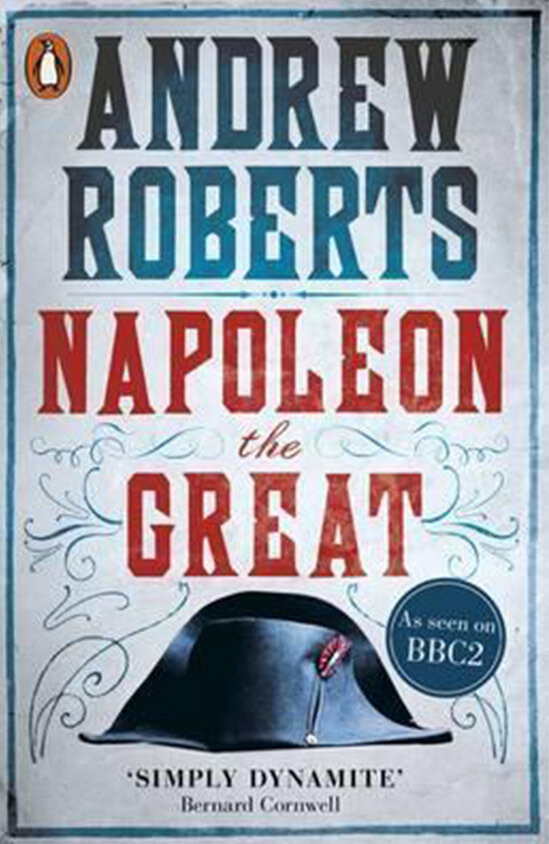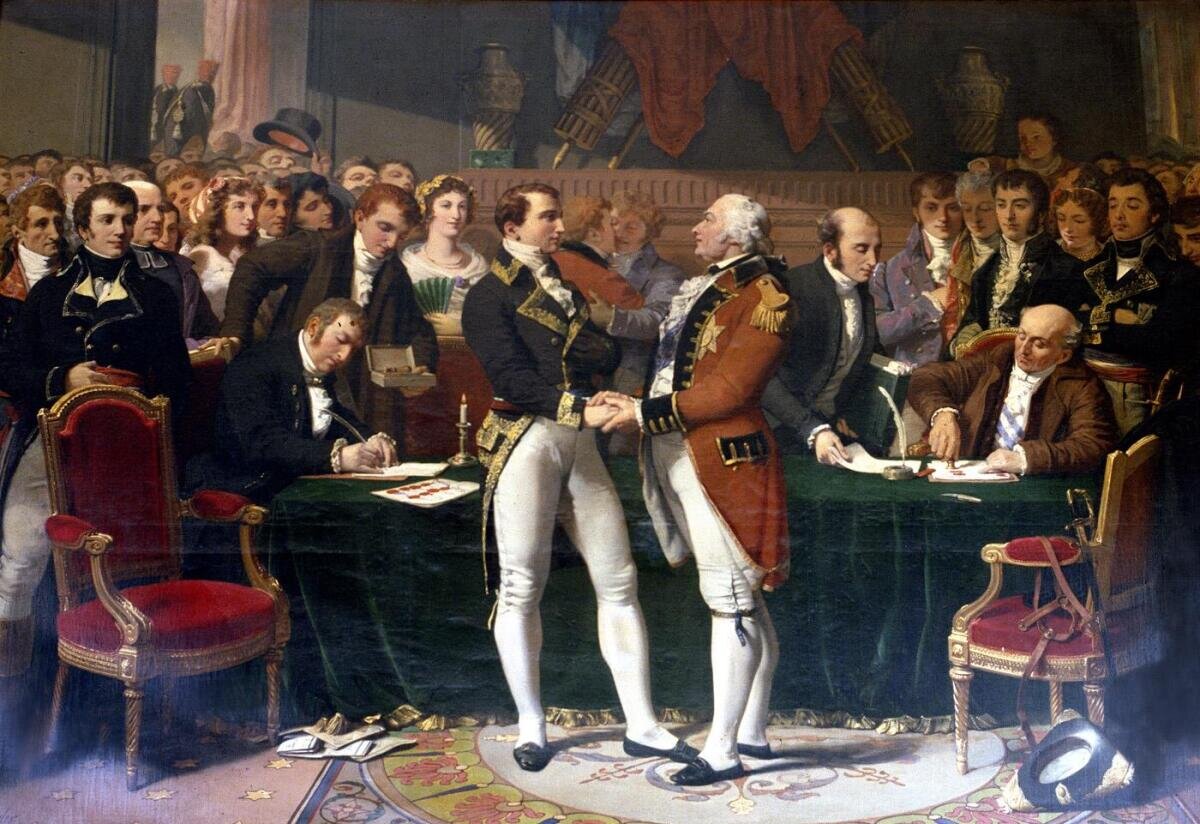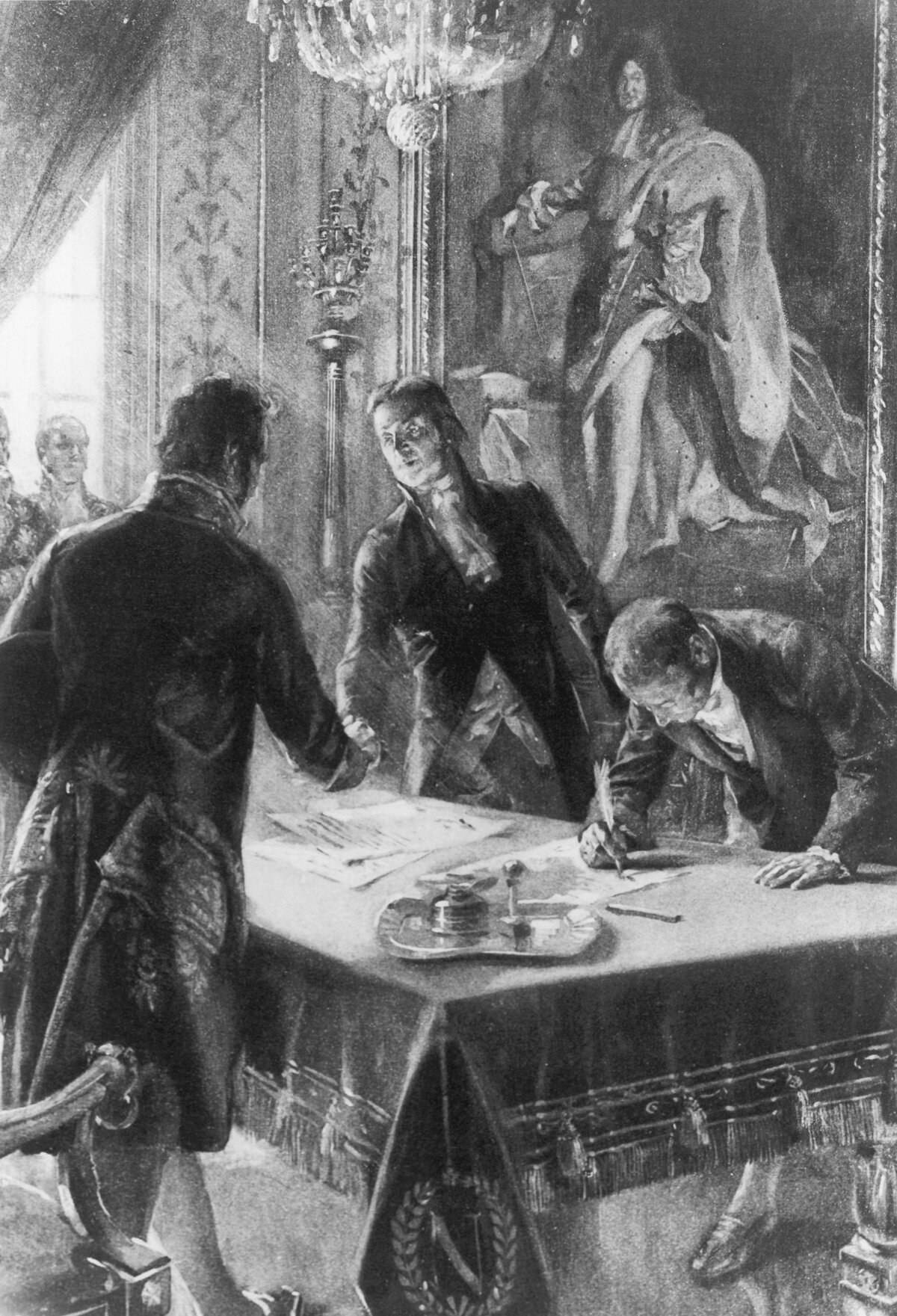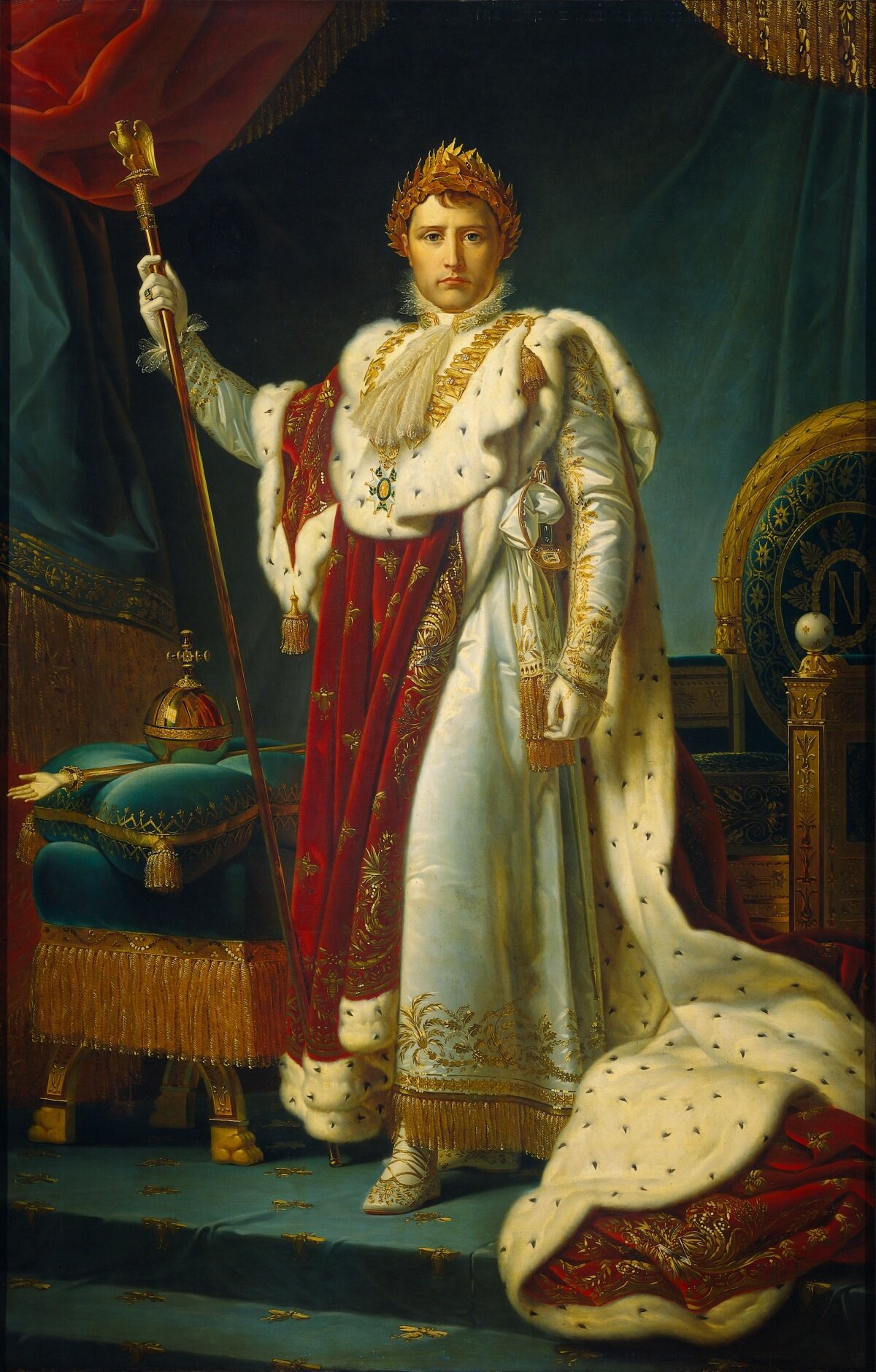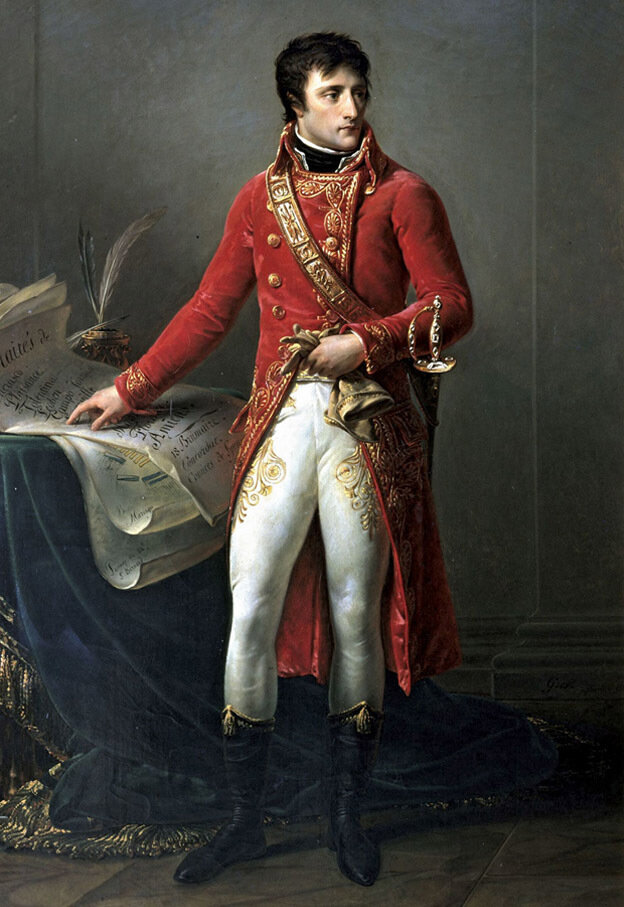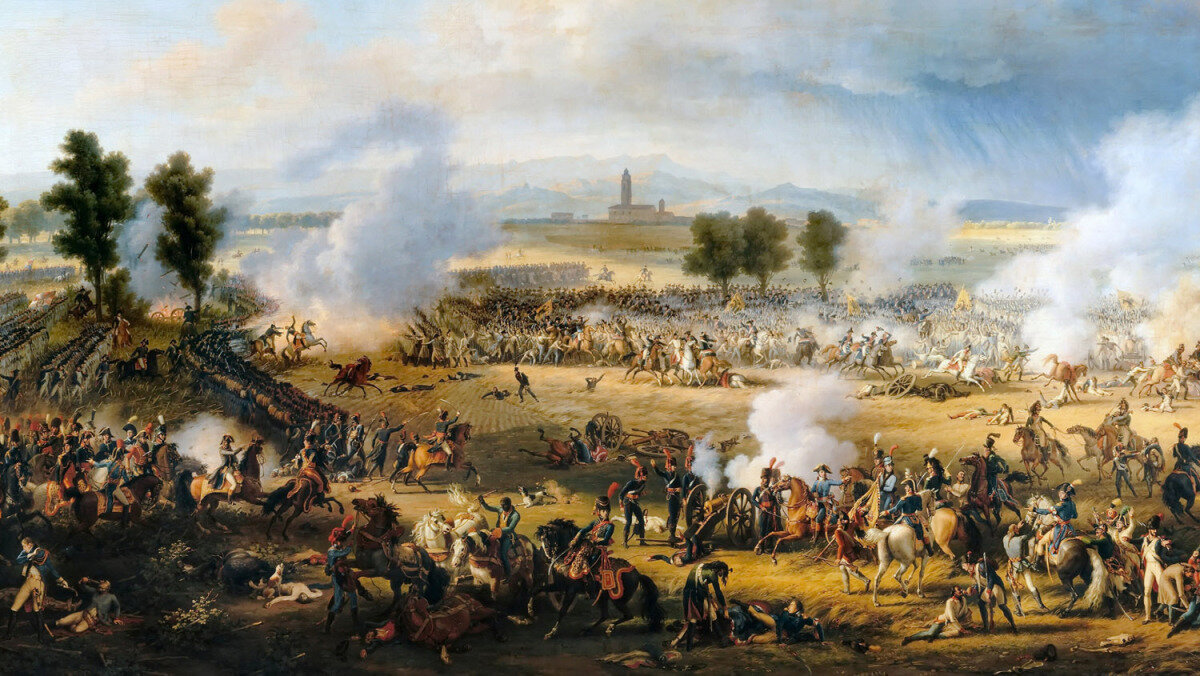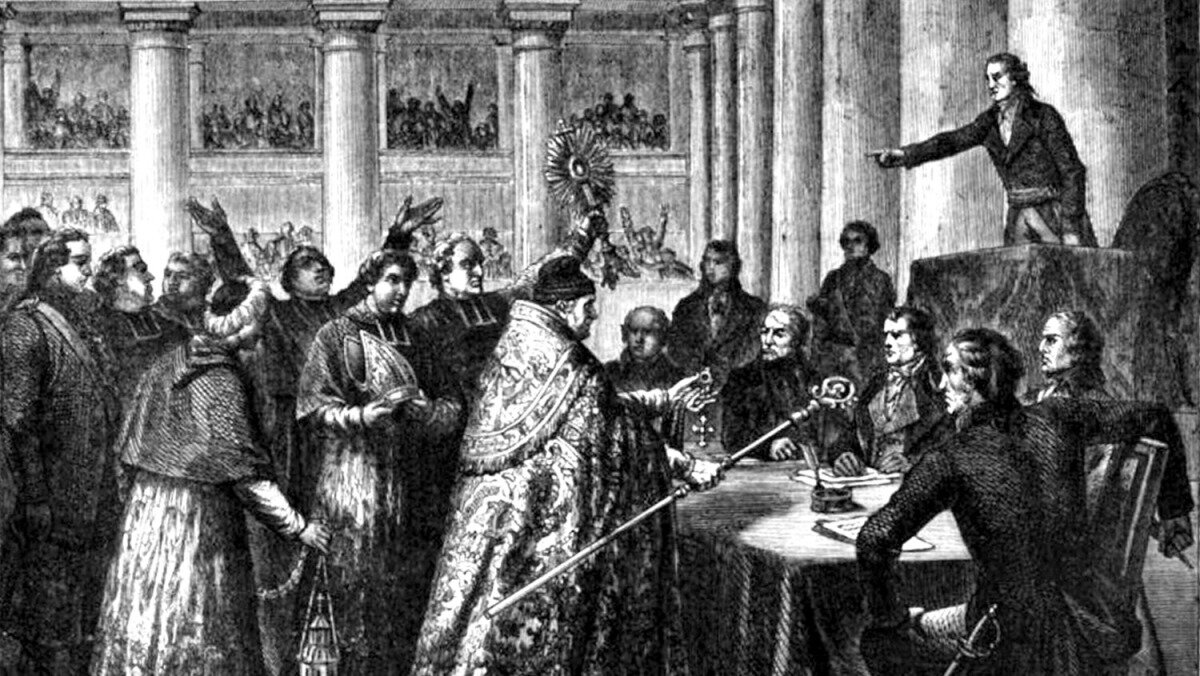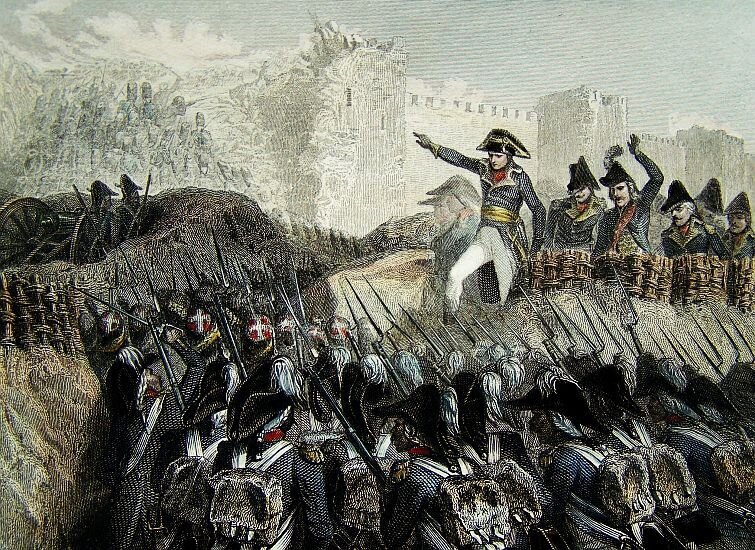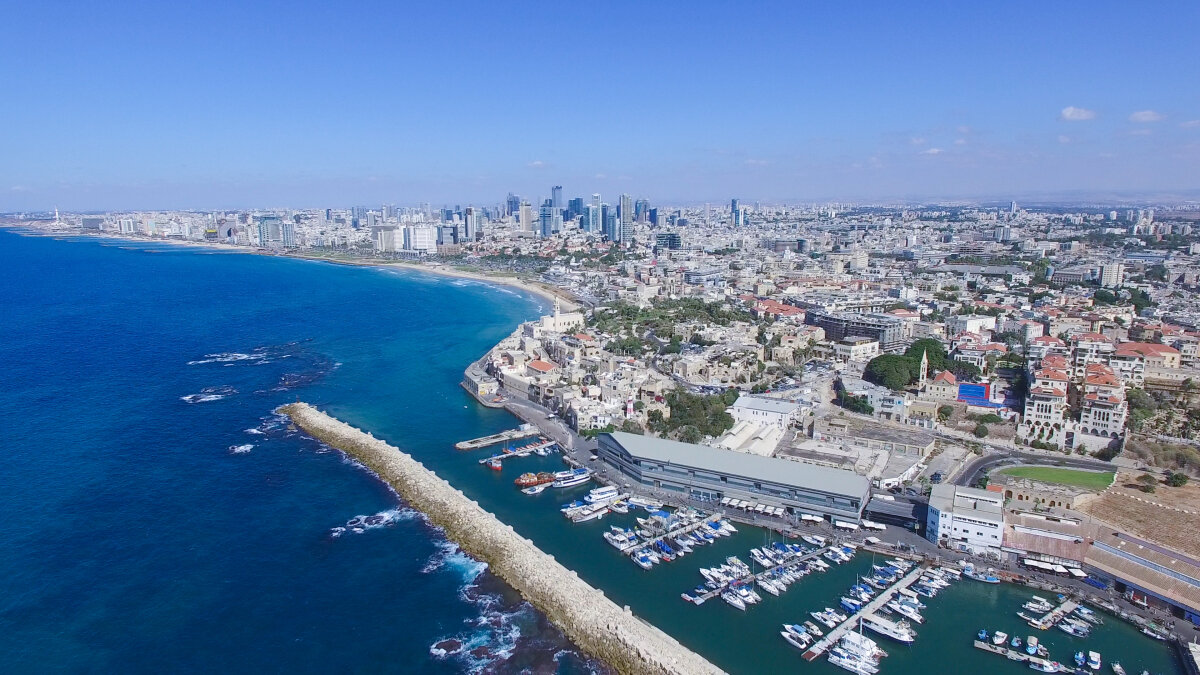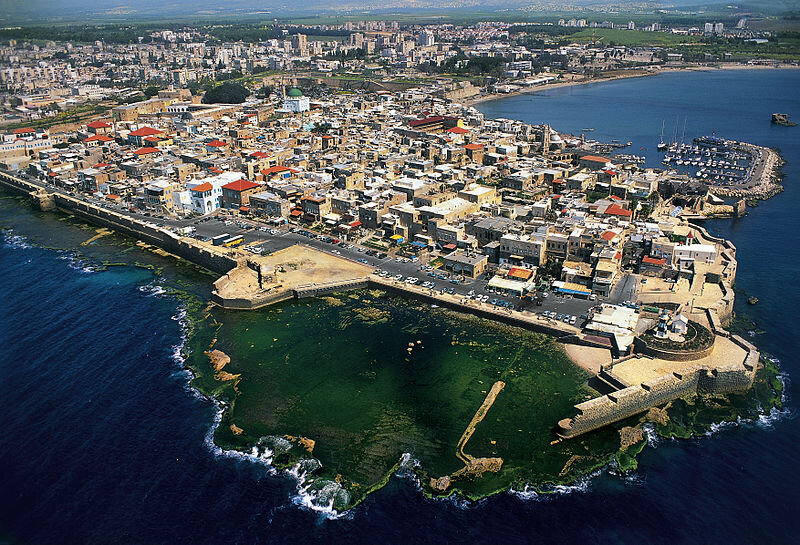Book Club: Napoleon the Great
Welcome! Trumpet executive editor Stephen Flurry’s Edstone Book Club resumed on January 17. Mr. Flurry and more than 20 club members are reading British historian Andrew Roberts’s book, Napoleon the Great.
Trumpet editor in chief Gerald Flurry has repeatedly encouraged his readers to study history, especially the history of great individuals and prophetically relevant time periods. Napoleon Bonaparte was on the scene during one of the most prophetically important periods in history. In his book The United States and Britain in Prophecy, Herbert W. Armstrong emphasized the critical years surrounding 1800, when the modern-day descendants of Ephraim and Manasseh inherited the birthright promises made to their forefather Abraham and suddenly exploded onto the world stage as major powers. Napoleon was center stage during this transition between the 18th and 19th centuries, and he played an important role in the fulfillment of God’s promise to Abraham.
Students of Bible prophecy also know that Napoleon led the fifth resurrection of the prophesied Holy Roman Empire (read The Holy Roman Empire in Prophecy for a detailed explanation of this history). The end of Napoleon’s empire in 1814 marked 1,260 years from Justinian’s Imperial Restoration in 554—the prophesied 1,260 years of Revelation 12:6 and 13:5 (read The True History of God’s True Church to understand this prophecy in more detail).
Aside from his role in Bible prophecy, Napoleon’s approach to warfare teaches us many important lessons about how we should approach our spiritual war. Mr. Flurry wrote in How to Be an Overcomer: “Napoleon Bonaparte was a ruthless dictator. But he was also one of the most phenomenally successful military leaders in history. Many great military men have studied him in detail, including Winston Churchill. His life contains principles and examples we can emulate in order to better fight our spiritual war.”
Andrew Roberts’s book on Napoleon will provide exciting details and context for some of the most important prophecies in the Bible. It will also add depth and meaning to some of the Trumpet’s books and booklets. Ultimately, that is what this club is about—bringing Bible history and prophecy alive and becoming stronger, more faith-filled and more active and powerful Christian soldiers.
The Edstone Book Club meets every Thursday evening. The meetings are recorded, and we hope to provide a synopsis of each club session every Friday, including write-ups, videos, illustration, and maps. If you have a question or feedback, or if you’d like to chime in with your two cents, you can e-mail Stephen Flurry and the Edstone Book Club at StephenFlurry@theTrumpet.com.

MEETING 9 | April 4, 2019
In the last club, Mr. Flurry discussed the Russian campaign, the campaigns of 1813 and 1814 against the allied forces of Europe, and the additional variables that lead to Napoleon’s banishment to the island of Elba (situated off the west coast of central Italy). Last night, we explored Bonaparte’s time in exile on Elba and St. Helena, as well as the Battle of Waterloo and some lessons we can take from it.
https://youtu.be/pqjkSw8hgJE
Elba
It is interesting to consider Napoleon’s relationship with the army before leaving for Elba. Roberts writes about this on page 714: “Yet even denuded of an officer corps and general staff, Napoleon could still have precipitated a civil war had he wished.” Despite losing at Leipzig, most of Bonaparte’s army remained loyal to and supportive of him. Roberts quotes former French President Charles de Gaulle’s comments about this on the same page: “Those he made suffer most, the soldiers, were the very ones who were most faithful to him.” Remarkably, the majority of Napoleon’s army still loved him, no matter how rough things got.
Before leaving for Elba, Napoleon reached out to his second wife Marie Louise in the hope that she would join him in his exile. But Klemens von Metternich, the Austrian foreign minister, persuaded the Austrian princess to travel to Rambouillet, where he said her father would soon join her. Although Marie Louise initially told Napoleon that she went against her will, she soon “gave up any plans she might have had to rejoin [Napoleon], and went instead to Vienna” (page 715). This was a low point in Napoleon’s life, and he attempted suicide by drinking a mixture of poisons and water. This attempt was unsuccessful because his aide in the next room heard Bonaparte’s groaning and called the doctors, who induced vomiting.
Napoleon left France for Elba on April 20, 1814. As Roberts writes on page 719, Napoleon still inspired loyalty in both men and women, even in disgrace: “Although loyalty and gratitude in political adversity are rare, Napoleon still had the capacity to inspire it, even when he had nothing to offer in return.”
Napoleon arrived at Elba on May 4 and received the ceremonial keys to the island, having been given the title “Emperor of Elba” in return for his abdication of the French throne. On the island, he was monitored by Colonel Sir Neil Campbell, the British commissioner, and the two spent quite a bit of time together. Napoleon was especially interested in the Duke of Wellington and gleaned as much information as he could about his character and leadership. “He [the Duke of Wellington] is a man of energy,” wrote Bonaparte. “To carry on war successfully, one must possess the like quality” (page 717). Was Bonaparte intentionally learning about the man he would face in battle just over one year later?
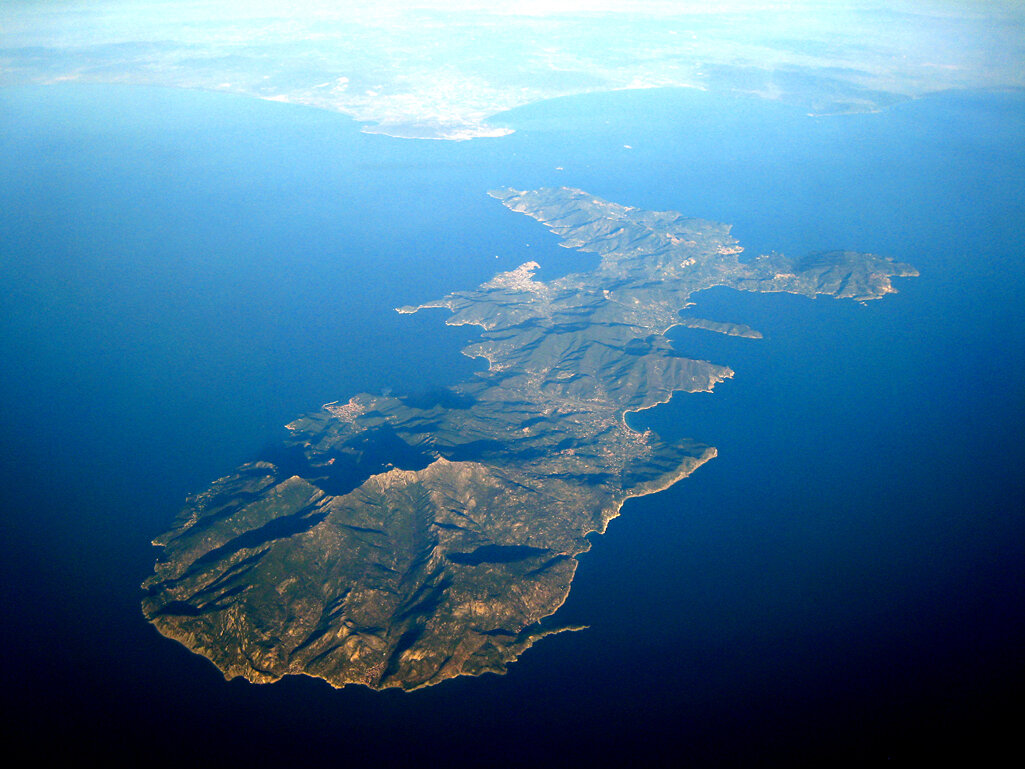
At Elba, Napoleon was incredibly productive. He initiated various major projects on the island, including reorganizing its defenses and building a hospital. On page 723, Roberts writes, “Any other sovereign might have relaxed on the charming, temperate, delightful island, especially after the grueling nature of the previous two years, but such was Napoleon’s nature that he flung himself energetically into every aspect of its life—while always on the lookout for an opportunity to slip past Campbell and return to France should the political situation there favor it.”
Colonel Campbell said of Napoleon, “I have never seen a man in any situation of life with so much personal activity and restless perseverance” (page 723). For all that Napoleon was facing, he still had energy and high morale.
After almost 10 months on Elba, Napoleon secretly left the island on a ship bound for France on February 26, 1815. He was back in action! He hustled toward Paris, picking up a retinue of supportive troops and followers as he went. In just under a month, Napoleon arrived at the Tuileries Palace in Paris on March 20 as “de facto emperor of the French” (page 738).
Safely ensconced in Paris, Bonaparte went straight to work stabilizing his army and planning for the upcoming battle against the seventh coalition that was formed against him. “Napoleon’s work ethic remained unchanged: in the three months between his return to the Tuileries and the battle of Waterloo he wrote over 900 letters,” Roberts writes on page 742.
Waterloo: Napoleon’s Last Battle
June 18, 1815, the day of the Battle of Waterloo, was the moment that marked the end of Napoleon’s military ambitions. By this point, most of his top generals were no longer alive. Only two would fight for him in the Battle of Waterloo—Marshal Michael Ney and Marshal Nicolas Soult (page 737). Waterloo was a unique battle for Napoleon because he committed many uncharacteristic errors in it. On page 757, Roberts writes that “Napoleon, Soult and Ney … fought one of the worst-commanded battles of the Napoleonic Wars. The best battlefield soldier Napoleon had fought before Waterloo had been Archduke Charles, and he was simply not prepared for a master-tactician of Wellington’s caliber—one, moreover, who had never lost a battle.”
By Waterloo, the raw energy Napoleon had in his mid-twenties was beginning to wane. Ultimately, Roberts attributes Napoleon’s loss to his failure to follow his own military advice: “Not committing the Guard at Borodino, staying too long in Moscow and Leipzig, splitting his forces in the Leipzig and Waterloo campaigns and, finally, coming to the decisive engagement on ground which his opponent had chosen: all were the result of Napoleon not following his own military maxims.”
Interestingly, in a footnote on page 766, Roberts writes: “When Waterloo is war-gamed, France usually wins.” On that same page, he writes, “The mystery of the battle of Waterloo is why a collection of fine and experience French combat generals of all three arms repeatedly failed to coordinate their efforts, as they had done successfully on so many previous battlefields.”
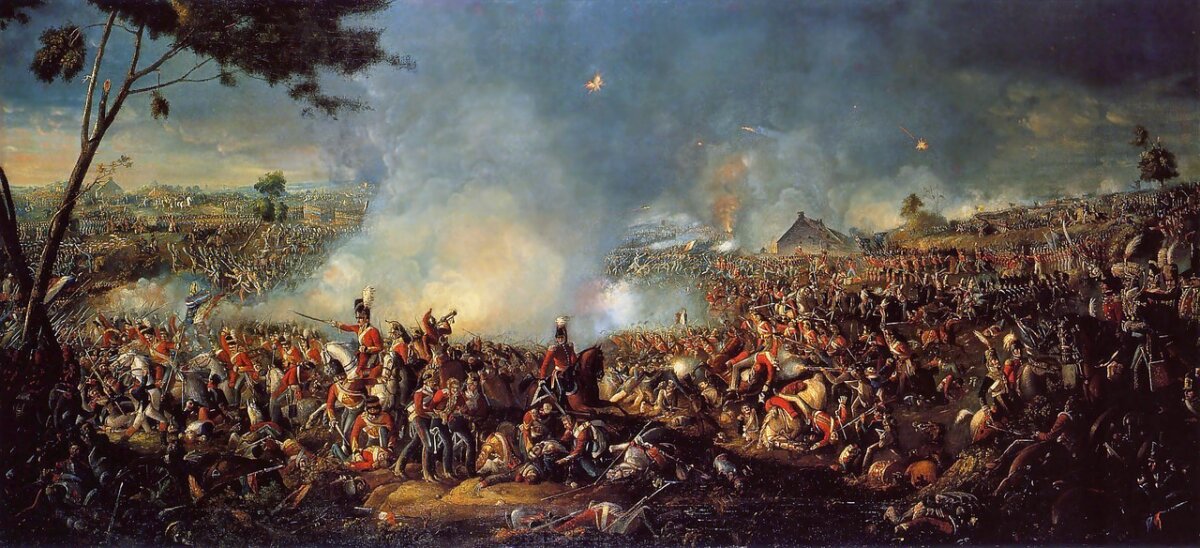
Ultimately, Waterloo marked the collapse of the fifth resurrection of the Holy Roman Empire. It was all in conjunction with God’s plan to raise up the British Empire! God had promised wonderful physical blessings to the descendants of Ephraim and Manasseh, but He also prophesied that if ancient Israel continued to rebel against Him, He would withhold the birthright blessings for 2,520 years. Leviticus 26:18 states, “And if ye will not for all this hearken unto me, then I will punish you seven times more for your sins.” The phrase “seven times” can refer to intensity or duration of punishment; as Herbert W. Armstrong explains in The United States and Britain in Prophecy, the emphasis in this verse is on the duration. A prophetic time is a 360-day year, so seven prophetic times is 2,520 days. Applying the day-for-a-year principle used elsewhere in the Bible (Ezekiel 4:4-6; Numbers 14:34; Revelation 12:6; Revelation 13:5) means that this refers to 2,520 years. Mr. Armstrong wrote, “Because of the manner in which this warning is worded, compared with the manner of wording where the ‘seven times’ is again mentioned—and because the birthright actually was withheld precisely 2,520 years—it is certain that the meaning of the ‘seven times’ in verse 18 is a duration of seven 360-day years, each day being a year in fulfillment—total: 2,520 actual years!”
That 2,520-year time span began when the northern kingdom of Israel went into captivity in 721-718 b.c. 2,520 years from that time (accounting for the fact that there is no year 0) is 1800-1803—exactly when the United States and Britain, the modern descendants of Ephraim and Manasseh, suddenly skyrocketed to power. As Napoleon’s empire declined, the British Empire rose to worldwide prominence.
In conjunction with this point, Mr. Flurry also shared this comprehensive quote from Roberts on pages 768-769:
Waterloo was the second costliest single-day battle of the Napoleonic Wars after Borodino. Between 25,000 and 31,000 Frenchmen were killed or wounded, and huge numbers captured. Wellington lost 17,200 men and Blücher a further 7,000. Of Napoleon’s sixty-four most senior generals who served in 1815, twenty-six were killed or wounded that year. ‘Incomprehensible day,’ Napoleon later said of Waterloo. He admitted that ‘he did not thoroughly understand the battle,’ the loss of which he blamed on ‘a combination of extraordinary Fates.’ Yet the genuinely incomprehensible thing was quite how many unforced errors he and his senior commanders had made. With his torpor the day before the battle, his strategic error over Grouchy, his failure to coordinate attacks and his refusal to grasp his last, best opportunity after La Haie Sainte fell, Napoleon’s performance after Ligny recalled those of his more ponderous Austrian enemies in the Italian campaigns nearly twenty years earlier. Not only did Wellington and Blücher deserve to win the battle of Waterloo: Napoleon very much deserved to lose it.
Lessons from Waterloo
Mr. Flurry concluded the club meeting with three lessons from Waterloo.
- Waterloo cleared the way for Britain, the birthright nation, to become the worlds’ greatest empire.
For this point, Mr. Flurry shared a quote from Churchill’s four-volume A History of the English-Speaking Peoples:
The downfall of Napoleon in 1815 left Britain in unchallenged dominion over a large portion of the globe. France and indeed the whole continent of Europe was exhausted. A united Germany had not yet arisen and Italy still lay in fragments. Russia was withdrawing from Western Europe. …. In the following decades revolution and civil commotion smote many of the Powers of Europe, and new nations were born. Britain alone escaped almost unscathed from these years of unrest. There was an unparalleled expansion of the English-Speaking Peoples both by birth and emigration.
The break between Britain and America made by the American Revolution was neither complete nor final. Intercourse continued and grew across the Atlantic. While America devoted her energies to the settlement of half the North American continent, Britain began to occupy and develop many vacant portions of the globe. … The colonization of Australia and New Zealand and the acquisition of South Africa in the decline of Holland created the new and wider British Empire still based upon sea-power and comprising a fifth of the human race, over which Queen Victoria, in the longest reign of British history, presided.
He also shared a quote from page 138 of Paul Kennedy’s The Rise and Fall of the Great Powers:
Napoleons’ hubris and refusal to compromise ensured not only his downfall, but his greatest enemy’s supreme victory. As Gneisenau, another general with a sense of the larger issues, wryly concluded: ‘Great Britain has no greater obligation than to this ruffian [Napoleon]. For through the events which he has brought about, England’s greatness, prosperity, and wealth have risen high. She is the mistress of the sea and neither in this dominion nor in world trade has she now a single rival to fear.
Finally, Mr. Flurry read from E. S. Creasy’s The 15 Decisive Battles of the World:
England has now been blessed with thirty-six years of peace. At no other period of her history can a similarly long cessation from a state of warfare be found. It is true that our troops have had battles to fight during this interval for the protection and extension of our Indian possessions and our colonies, but these have been with distant and unimportant enemies. The danger has never been brought near our own shores, and no matter of vital importance to our empire has ever been at stake. We have not had hostilities with France, America, or Russia; and when not at war with any of our peers, we feel ourselves to substantially be at peace.
- Waterloo marked the end of the Holy Roman Empire for roughly one century.
Although Napoleon’s first defeat in 1814 was more significant from a prophetic standpoint, Waterloo in June 1815 emphatically signaled a new era for the world—a world that transitioned from being dominated by the fifth resurrection of the Holy Roman Empire to a being dominated by the British Empire.
- Waterloo opened the door to German nationalism.
Mr. Flurry again quoted from Churchill’s A History of the English-Speaking Peoples: “After a generation of warfare, peace had come to Europe in the summer of 1815. It was to be a long peace, disturbed by civil commotions and local campaigns, but flaring into no major blaze until the era of German expansion succeeded the age of French predominance.”
Mr. Flurry also read this quote from Paul Johnson’s Napoleon:
The totalitarian state of the twentieth century was the ultimate progeny of the Napoleonic reality and myth. It is right, therefore, that we should study Bonaparte’s spectacular career unromantically, skeptically, and searchingly. At the beginning of the twenty-first century, anxious as we are to avoid the tragic mistakes of the twentieth, we must learn from Bonaparte’s life what to fear and what to avoid.
St. Helena
On July 23, 1815 Napoleon saw France for the last time. He was banished to St. Helena, a little island in the South Atlantic Ocean. This island is 4,400 miles from the south coast of England (page 779). While en route to England before heading to St. Helena, Napoleon told Captain Maitland of the British HMS Bellerophon, whom he had surrendered to: “If it had not been for you English, I should have been Emperor of the East; but wherever there is water to float a ship we are sure to find you in our way” (page 777).

Little 85-square-mile St. Helena had a population of about 4,000, Roberts notes on page 781. It was Napoleon’s home for five and a half years, before he died at the age of 51 from stomach cancer on May 5, 1821 (page 801).
Mr. Flurry ended the club with this quote from Napoleon himself, which is recorded on pages 812-813 of Roberts’s book:
If I appear always ready to answer for everything and to meet everything, it is because, before entering on an understanding, I have meditated for a long time, and have foreseen what might happen. It is not genius which reveals to me suddenly, secretly, what I have to say or do in a circumstance unexpected by other people: it is reflection, meditation.
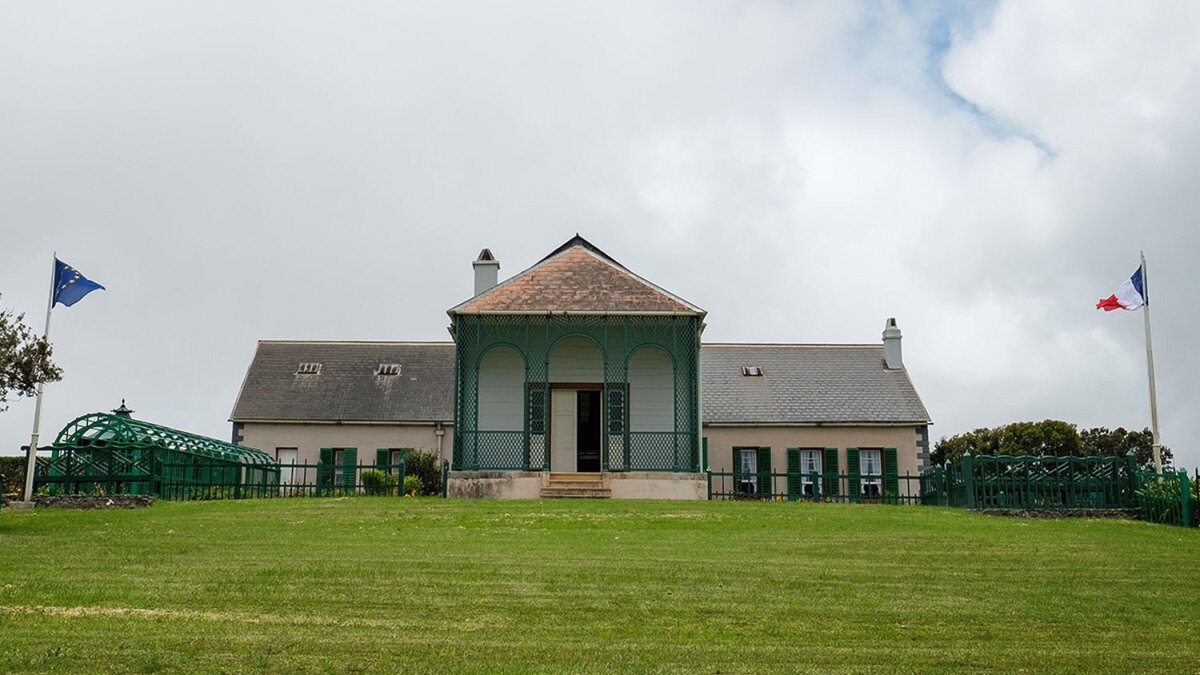
Napoleon Bonaparte was an individual who left a lasting impact on the history of war and the history of the world as a whole. He was a brutal, immoral despot, but he was also a skilled general whose battle tactics can teach us a lot about how to fight our own spiritual war. As Roberts writes in the conclusion of his book (page 814), quoting George Home, a midshipman aboard the HMS Bellerophon: “He showed us what one little human creature like ourselves could accomplish in a span so short.”

MEETING 8 | March 28, 2019
At the last meeting, we explored Napoleon’s cataclysmic decision to embark on the Russian campaign, the trials he and the Grande Armée faced along the way, and how the incursion into Russia was the beginning of the end for Napoleon and his empire. Last night, Mr. Flurry discussed the results of the Russian campaign, his 1813 and 1814 campaigns against the allied forces of Europe, and the additional variables that lead to Bonaparte’s ultimate downfall and banishment to the island of Elba, which is situated just off the west coast of central Italy.
Mr. Flurry started with this quote from History.com, which summarized Napoleon’s position during and after the Russian campaign:
At the same time as the catastrophic Russian invasion, French forces were engaged in the Peninsular War (1808-1814), which resulted in the Spanish and Portuguese, with assistance from the British, driving the French from the Iberian Peninsula. This loss was followed in 1813 by the Battle of Leipzig, also known as the Battle of Nations, in which Napoleon’s forces were defeated by a coalition that included Austrian, Prussian, Russian and Swedish troops. Napoleon then retreated to France, and in March 1814 coalition forces captured Paris.
This is what Czar Alexander, Russia’s leader, said to the Lithuanian novelist and noblewoman Sophie de Tisenhaus in late December 1812: “What a career he has ruined! Having gained so much glory, he could bestow peace on Europe, and he has not done so. The spell is broken” (page 635). After Russia, Napoleon was on the path to his downfall.
Mr. Flurry shared another quote from an article entitled “Napoleon’s Russian Campaign: The Retreat”:
On the 15th September, a week after the bloody battle of Borodino, Napoleon entered Moscow. He had expected to enter with glory, met by a delegation of the city’s highest officials and assembled in recognition of his victory and ready to negotiate peace. But there was no delegation; in fact, there was hardly anyone left there at all. Of Moscow’s 200,000 inhabitants from before the war, only 2% remained, predominantly wounded soldiers and some remaining to plunder the homes of those who had fled.
Even less could Napoleon have predicted how soon he would also be leaving the city; since it was also on the day he arrived that the first fires were lit ….
https://youtu.be/xuSormDtt4w
Napoleon later claimed that he and his army could have stayed in Moscow for the winter, if the city had not been set on fire (page 612). In the end, he identified the weather as the cause of his failure. Roberts writes about this on page 629: “Entirely blaming the weather—‘so cruel a season’—for the disaster, he wrote that, with temperatures unexpectedly down to -27 degrees Celsius, ‘the cavalry, artillery and baggage horses perished every night, not only by hundreds, but by thousands ….’”
In a footnote on page 635, Roberts explains that Napoleon lost 524,000 soldiers in the Russia campaign: “[R]egular military action in significant confrontations accounted for just under 40 percent of the overall losses that Napoleon’s army suffered in Russia. Disease, exposure, starvation, partisan action, suicide and all of the myriad other ways in which death sought out soldiers in that campaign accounted for the other 60 percent, with as many men losing their lives when advancing on Moscow as retreating from it.”
The 1813 Campaign
During the 1813 campaign, France fought against the allied forces of Russia, Prussia, and Austria. Napoleon also began to lose many of his closest friends and supporters. “The list of friends and close comrades Napoleon had lost in battle,” Roberts writes on page 654, “was by now long and doleful …. Nor was it to end there.” With every battle fought, Napoleon’s circle of trusted friends grew smaller.
In June 1813, Napoleon signed an armistice in the hope that he would lose fewer soldiers. “It was not in Napoleon’s nature to agree to armistices,” Roberts writes on page 654, “which went totally against his concept of war as a fast-moving surge of aggression in which he always kept the initiative.”
Napoleon’s meeting with Austrian diplomat Klemens von Metternich in Dresden on June 26, 1813, was a decisive moment for Austria; it marked the beginning of Austria’s transition from being an ally of France to an enemy. Austria’s change of alliances accelerated Napoleon’s downfall. On page 657, Roberts wrote that Metternich “thought that Dresden was the moment when he, rather than Napoleon, could decide the fate of the continent.” Of course, Napoleon had hoped that his marriage to Marie Louise, the daughter of Austrian Emperor Francis II, would sustain his connection with Austria. This connection was broken at Dresden in June 1813. “I want peace,” Napoleon told his wife after meeting with Metternich, “but it must be an honorable one” (page 659).
On the same day that it severed its alliance with France, Austria secretly made an alliance with Russia and Prussia. Regarding Metternich’s maneuvers, Roberts says on page 663: “The deftness with which Metternich had drawn Austria out of her alliance, then into neutrality, then into supposedly objective mediation, and then, the day after the end of the armistice, into the Sixth Coalition has been described as ‘a masterpiece of diplomacy.’”
Dresden and Leipzig
By late 1813, Napoleon and the Grand Armée were at war with Russia and Prussia. Napoleon would make detrimental military decisions in the battles of Dresden and Leipzig: “[H]e made the serious error of splitting his army—contradicting two of his own most important military maxims: ‘Keep your forces concentrated’ and ‘Do not squander them in little packets’” (page 664). Roberts gives the reason for this deleterious decision on page 673, quoting General Thiébault, one of Napoleon’s commanders: “… Napoleon had never till then had more than one opposing army to deal with at one time; now he had three, and he could not attack one without exposing his flank to the others.”
Although Napoleon won the battle of Dresden on August 26, 1813, by “the end of August all the advantage Napoleon had gained from his victory at Dresden had been thrown away by his lieutenants” (page 672).
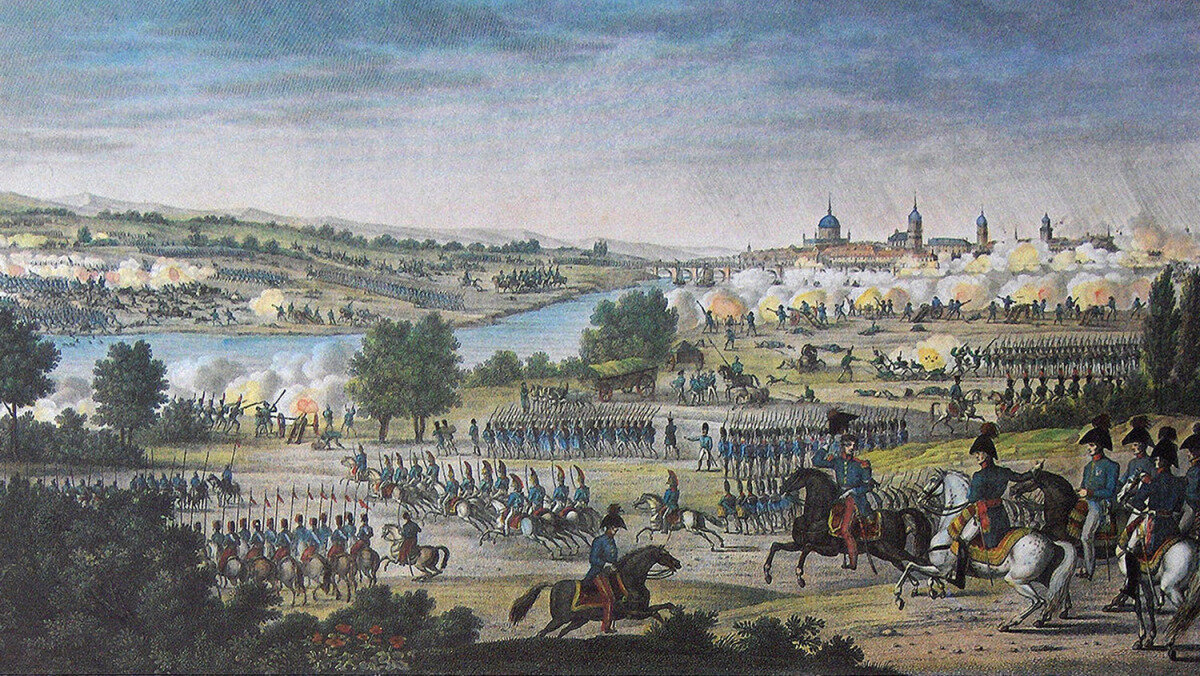
The battle of Leipzig on October 16-19, Roberts writes on page 675, was “the largest battle in European history up to that moment.” It involved all of the most prominent nations and leaders in Europe, including the French, Germans, Russians, Swedes, Italians, Poles, Austrians, and more. It has been called the “The Battle of the Nations” and was, in this way, like a preview of World War I.
Mr. Flurry quoted from Warfare History Network to illustrate the logistics of Leipzig:
Following the disastrous retreat of his Grand Armée from Russia in the winter of 1812, Napoleon Bonaparte, still a renowned military commander and the Emperor of France, recruited a new army and prepared to defend France against the coalition forces of Russia Prussia, Sweden and Austria. Although he raised an army of 200,000, the force was barely one-third the size of that which he had taken into Russia, and its raw recruits were not of the fighting caliber of his lost veteran soldiers. In contrast, the Coalition army numbered nearly 400,000, and it fielded 1,400 pieces of artillery, twice that of Napoleon’s inexperienced contingent.
By the end of 1813, Napoleon’s army was suffering. Meanwhile, his defeats were becoming a rallying cry for the allies. Roberts writes on page 684: “Between the dead and the wounded, Napoleon lost around 47,000 men over the three days. Some 38,000 men were captured, along with 325 guns, 900 wagons, and 28 colors and standards (including three eagles), making it statistically easily the worst defeat of his career.”
By the end of the year, Russia, Prussia and Austria were ready to push into France itself. Never one to concede failure, Napoleon was determined to resist.
The 1814 Campaign
On January 24, 1814, Napoleon left for the battlefront in France. He would never see his wife or son again (page 692). In this war, Bonaparte would fight against an army of one million men. His military campaign was impressive, considering he had only 70,000 soldiers. On page 695, Roberts quotes the Duke of Wellington, who said that Napoleon’s 1814 campaign gave him “a greater idea of his genius than any other. Had he continued that system a little longer, it is my opinion that he would have saved Paris.”
“During the 1814 campaign,” Roberts writes on page 707, “Napoleon covered over 1,000 miles and slept in forty-eight different places in sixty-five days. Yet for all this movement, his three defeats—La Rothière, Lâon, and Arcis—all came from staying too long in the same place ….”
As Mr. Flurry noted, Napoleon continued to go on the offensive, even though his army was much smaller. On March 30, 1814, the allied forces captured Paris. Roberts writes on page 709 that Napoleon “became the first French monarch to lose the capital since the English occupation of 1420-36.”
A few days later, one of Napoleon’s generals, Auguste de Marmont, betrayed Napoleon: “[On] April 4 Marmont marched his corps straight into the Allied camp to capitulate, along with all their arms and ammunition. This led the Tsar to demand Napoleon’s unconditional abdication” (page 711).
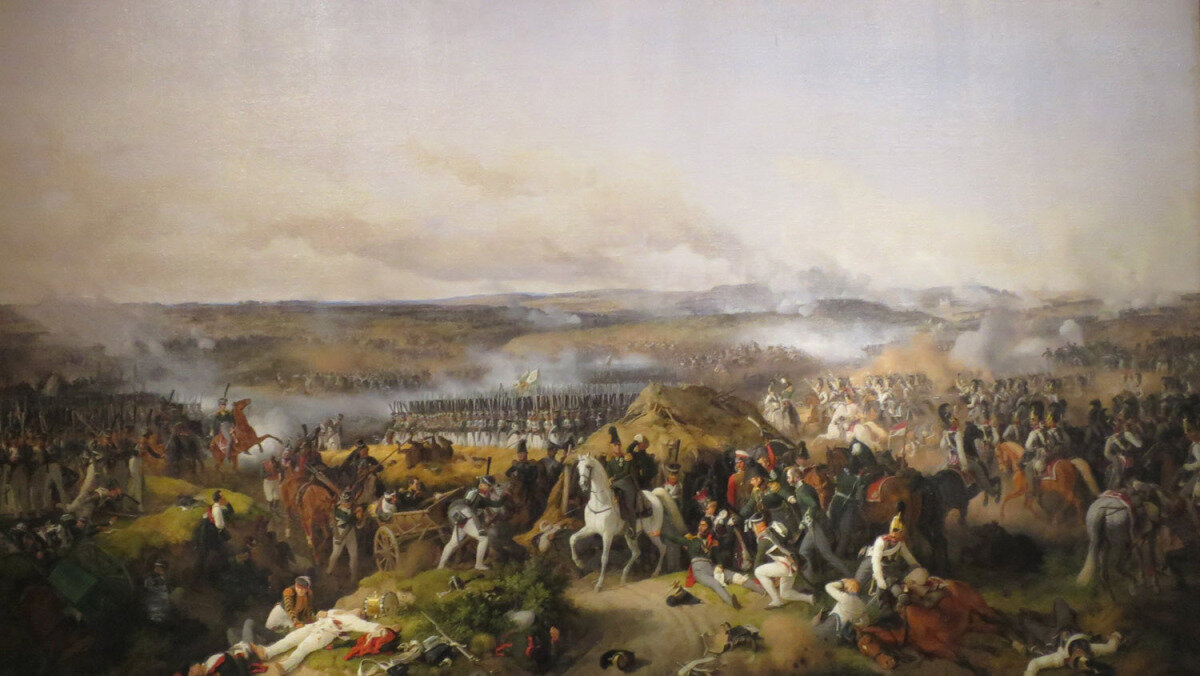
Mr. Flurry concluded the meeting with three quotes that draw attention to the causes of Napoleon’s downfall. The first one was from an online history tutor:
Throughout the years of 1806-1814, a number of factors coalesced to result in Napoleon’s downfall. Significant causes of his downfall included the Continental Blockade, the Peninsular War, the Russian Campaign, and the direct role of Britain. Arguably, Britain’s role in the Continental Blockade was the main reason for why Napoleon fell from power, offsetting consequences which include Napoleon’s failed Spanish and Russian campaigns.
Then Mr. Flurry quoted an article from War History Online titled “One of the Main Reasons for Napoleon Bonaparte’s Downfall—He Could Not Conquer at Sea”:
Throughout the Napoleonic Wars, the French tried to maintain a naval blockade against British trade. However, due to their superior fleet, it was the British who were able to maintain effective blockades. Production was hampered at French shipyards as materials could not be brought in.
He concluded with another quote from War History Online, from “The Battle of Leipzig—the Largest Battle on European Soil Prior to WWI”:
The Napoleonic Wars of the 19th century were, in many ways, a precursor to the World Wars of the 20th century that would rock first almost the entire Western world with WWI, and then almost the whole world with WWII. Like the World Wars, the Napoleonic Wars involved many nations, had repercussions that were felt across the globe in an increasingly interconnected world and changed world history in major ways.

MEETING 7 | March 14, 2019
Last week, Mr. Flurry focused on British Prime Minister Spencer Perceval’s view of Napoleon and Bonaparte’s incredible work ethic, his tumultuous relationship with the Vatican and his divorce from Josephine. Last night, the club explored Napoleon’s fatal decision to campaign in Russia, the trials he and the Grande Armée faced along the way, and how the Russia incursion was the beginning of the end for Napoleon and his empire.
Mr. Flurry started out with a quote from a Trumpet article entitled “The Vicious Cycle: German-Russian Relations”:
In 1807, Czar Alexander i and Napoleon signed the Treaty of Tilsit. It contained a secret clause that split Europe between Russia and France. Russia secretly agreed to help France against Britain in the West, while France secretly agreed to help Russia against the Ottomans in the East. Napoleon and Alexander even discussed a joint attack on Britain in India. But the alliance fell apart in 1812 when Napoleon decided the Russians were not doing enough against Britain and attacked them. Once again, Europe and Russia whiplashed from friends back into enemies.
Although Czar Alexander i and Napoleon Bonaparte enjoyed each other’s company and had many qualities in common, the relationship was ultimately overtaken by geopolitics. At the end of the day, France and Russia were competing superpowers. Europe’s geography meant that these two superpowers were in constant contact and, ultimately, conflict.
There has been a lot of discussion about the reasons why Napoleon’s Russia campaign failed. Napoleonic historian and author Robert Burnham brings out a few key reasons in “Why Did Napoleon Fail in Russia in 1812?” These include:
- Faulty logistics—Bonaparte had great difficulty keeping his army supplied with food, clothes and weapons.
- Poor discipline—Morale and discipline suffered as conditions deteriorated, especially on the retreat from Moscow.
- Disease—Typhus, an infectious disease spread by lice, fleas or mites, killed more than 50,000 in the first month of the campaign.
- Weather—Temperatures during Napoleon’s withdrawal from Moscow fell as low as -30 Celsius. Thousands of men and horses literally froze to death. Conditions were so bad that many committed suicide.
https://youtu.be/38F8dnodWtU
Preparing for War
Roberts shows that there were plenty of justifiable reasons for Napoleon to avoid invading Russia in 1812. In the end, however, Napoleon was the emperor of Europe and a military general unaccustomed to defeat. In the Russia campaign, Napoleon was unable to engage in the blitzkrieg-style invasions which had been so successful in previous campaigns. Marching across the seemingly endless, unforgiving Russian wilderness was not conducive to blitzkrieg warfare. On page 571, Roberts explains how much time Russia had to prepare for the conflict: “From the moment that the first mobilization orders went out to Rhine Confederation contingents in early 1811, the Russians had well over a year to prepare, time that they used extremely well. In all his other campaigns Napoleon’s opponents had been lucky if they had a matter of weeks to get ready for his onslaught.”
In the lead-up to the war, Russia also made an alliance with Turkey through the Treaty of Bucharest. This treaty with the Turks secured Russia’s southwestern flank. Meanwhile, due to what Roberts calls Napoleon’s “inability to treat Bernadotte and Sweden with respect and indulgence,” Bonaparte lost the support of Sweden to Russia as well. Despite losing both Turkey and Sweden as allies, Napoleon pressed forward with his plans to invade Russia.
Roberts quotes Bonaparte describing the Russia campaign as “the greatest and most difficult enterprise I’ve ever attempted. But what has been begun must be carried through.” Bonaparte was stubbornly committed to the invasion and would let nothing stand in his path.
Invasion of Russia
Roberts interjects a quote from Field Marshal Viscount Montgomery at the start of chapter 24: “Rule one on page one of the book of war, is: ‘Do not march on Moscow.’” Napoleon would learn this rule the hard way.
On June 24, 1812, Napoleon crossed the Niemen River with his multinational army. The sheer size of Napoleon’s army was historic. According to Roberts on page 577, he had 1 million troops at the time, about 615,000 of which he took to Russia. “It was certainly the largest invasion force in the history of mankind to that time,” Roberts says on that same page, “and very much a multi-national one.” On page 577, Roberts also writes: “Some 48 percent of Napoleon’s infantry were French and 52 percent foreign, whereas the cavalry was 64 percent French and 36 percent foreign.” The sheer number of foreign troops meant that Napoleon struggled with his army’s unity and patriotism in this campaign. With the army divided, igniting esprit de corps in them would be much more challenging.
As Roberts wrote on page, 579, “This was to be a campaign utterly unlike any he had fought before, indeed unlike any in history.”
As Napoleon marched deeper and deeper into Russia, the Russians constantly retreated, luring the French army further into Russian territory and further from supplies and reinforcements. “The Russians,” Roberts writes on page 586, “were retreating steadily before the Grande Armée—the first clash to cost either side more than a thousand casualties didn’t come for four weeks—but that didn’t mean they were offering no resistance. Recognizing that this war was going to be as much about logistics as battles, they systematically destroyed anything that couldn’t be removed. … [E]verything that could be of any use whatever to the oncoming French was either taken away or burned, for many miles on both sides of the road.”
To make matters worse, the Grand Armée was hit by a typhus epidemic. “Heat, lack of water for washing, troops packed together in large numbers at night, the hovels in which they sheltered, scratching irritable areas, not changing clothes: all were ideal conditions for spreading typhus. … Within a month of the start of the invasion, Napoleon had lost one-fifth of the men in his central army group” (page 588).
The campaign began with gumption and gusto, but the energy and momentum quickly faded. Falsely positive reports of how many supplies remained and the welfare of his army were also beginning to reach Napoleon. “Somehow,” Roberts says on page 591, “the culture of the army had changed, so that Napoleon, who used to be so close to his men, was now regularly lied to by his senior commanders.” Despite all of these issues, Napoleon continued to pursue his enemy deeper into Russia.
Settling in Vitebsk in late July, Napoleon was advised to wait out the winter—but he rejected this advice and pushed deeper into Russia. He stuck with his conviction that “boldness was the only prudential course” (page 595).
On page 600, Roberts writes: “The simple fact that Napoleon had missed was also the most obvious one: its vast size made Russia impossible to invade much beyond Vilnius in a single campaign. His military administration was incapable of dealing with the enormous strain that he was putting on it. Each day, in his desperation for a decisive battle, he had fallen further into [the Russians’] trap.”
The Battle of Borodino
The Battle of Borodino was “the bloodiest single day in the history of warfare until the first battle of the Marne over a century later” (page 604). As Mr. Flurry highlighted, the gruesome and violent battle was an all-out slugfest between two superpowers. Both sides suffered tremendous amounts of casualties. On page 608, Roberts quotes Major Louis Joseph Vionnet of the Middle Guard: “Any water to be found on the field was so soaked with blood that even the horses refused to drink it.” The carnage was beyond anything anyone at the time had experienced.
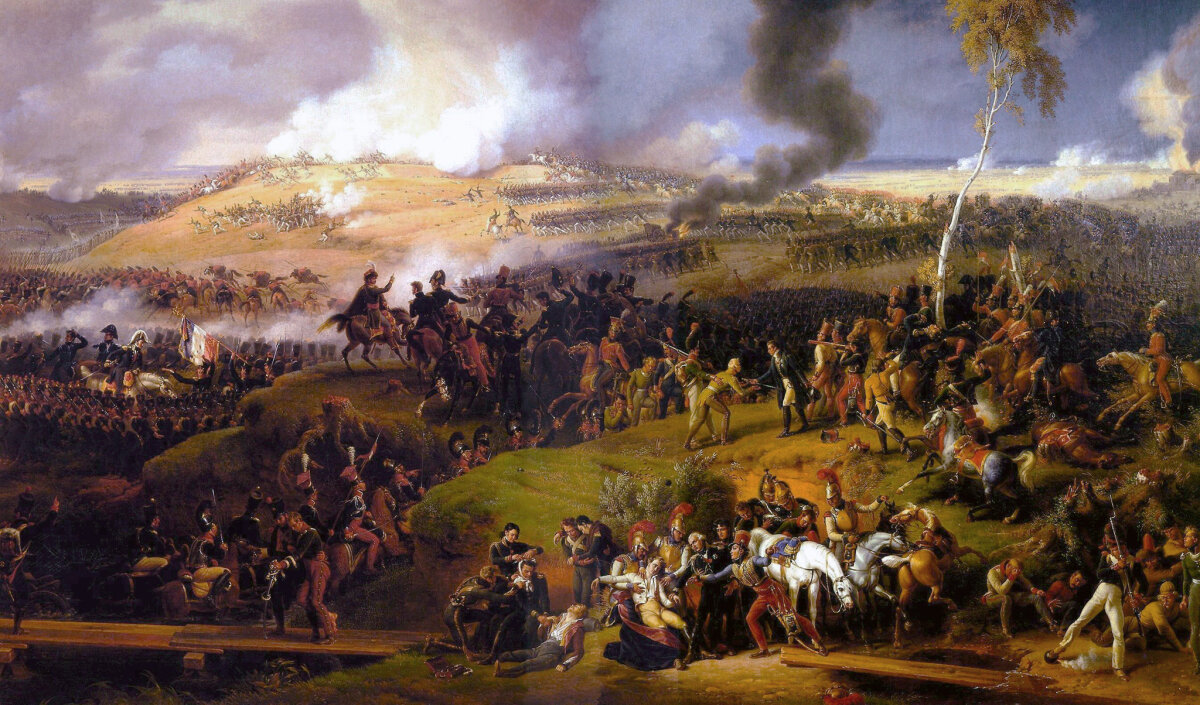
Mr. Flurry concluded club with the following quote from “Why Napoleon’s Invasion of Russia Was the Beginning of the End,” an article from History.com. This quote provides a glimpse into what we can expect to cover in the next club:
[T]he Russians did not truly make a stand until the September 7 Battle of Borodino, which took place just 75 miles from Moscow. That day, the French and Russians pounded each other with artillery and launched a number of charges and countercharges. Roughly three cannon booms and seven musket shots rang out each second. …
Originally, he planned a southerly retreat, but his troops were forced back to the road they took in after a replenished Russian army engaged them at Maloyaroslavets. All forage along that route had already been consumed, and when the army arrived at Smolensk it found that stragglers had eaten the food left there. Horses were dying in droves, and the Grade Armée’s flanks and rear guard faced constant attacks. To top it off, an unusually early winter set in, complete with high winds, sub-zero temperatures and lots of snow. On particularly bad nights, thousands of men and horses succumbed to exposure. Stories abound of soldiers splitting open dead animals and crawling inside for warmth, or stacking dead bodies in windows for insulation. ‘Things got bad very quickly,’ [Sheperd Paine, president of the Napoleonic Historical Society] said. ‘It was a constant attrition.’
In late November, the Grande Armée narrowly escaped complete annihilation when it crossed the frigid Berezina River, but it had to leave behind thousands of wounded. ‘From then on, it was almost every man for himself,’ Paine said.
If there is one thing that Napoleon’s Russia campaign of 1812 proved, it was that the Grand Armée was not invincible. Napoleon’s march into Russia was a devastating blow to the Grand Armée and the beginning of the end of the Napoleonic empire.

MEETING 6 | March 7, 2019
Last club, Mr. Flurry focused on Napoleon’s unique contributions to the art of war, his ability to generate esprit de corps, and the Battle of Trafalgar. In this week’s club, he focused on British Prime Minister Spencer Perceval’s view of Napoleon and Bonaparte’s incredible work ethic, his tumultuous relationship with the Vatican and his divorce from Josephine.
Mr. Flurry started by briefly drawing attention to the “relentless drive” (page 422) of Napoleon and the Grand Armeè through Prussia. After the battle of Jena, the emperor was anxious to drive his army forward into Prussia. Roberts quotes him telling Josephine on page 423, “I am wonderfully well; fatigue agrees with me.” A few days later, he conquered Berlin.
“On Friday, November 21, 1806,” Roberts writes on page 427, “he signed into law the Berlin Decrees. These were designed to force Great Britain to the negotiating table, but instead were to lead—once he tried to impose them by force on Portugal, Spain and Russia—to his own downfall.”
Britain retaliated with the Orders-in-Council in 1807, which blockaded France and prevented America from trading with France without Britain’s approval. As Roberts says on the next page, “[T]he November 1807 Orders-in-Council were the primary cause of the War of 1812 between Britain and the United States.”
https://youtu.be/lm-v7WdOJbQ
Prime Minister Spencer Perceval
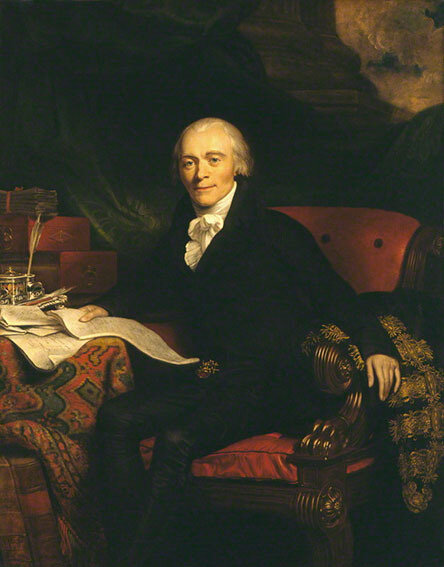
Mr. Flurry spent several minutes talking about British Prime Minister Spencer Perceval (in office 1809-1812) and his belief that Napoleon Bonaparte was the fifth head of the Holy Roman Empire. On page 431, Roberts writes that Perceval believed “Napoleon could be identified in the Book of Revelation as ‘the woman who rides upon the beast, who is drunk with the blood of the saints, the mother of harlots.’”
This was an insightful observation from a 19th century British Prime Minister! Perceval knew and believed the Bible. He believed in the prophecies of Revelation and the second coming of Jesus Christ. It was disappointing to see Andrew Roberts, a modern British academic, label Perceval “deranged” and “unhinged” simply because he dared believe the Bible. At the time, the British people clearly didn’t think he was deranged—they made him prime minister!
Mr. Flurry shared a lengthy quote about Perceval from an April 2012 Telegraph article, “Spencer Perceval deserves better from posterity”:
A committed evangelical, he was profoundly religious (one reason why he hated slavery). He and his fellow-evangelicals believed that his accession to the premiership was an example of divine providence, and his co-religionists were thrown into confusion by his murder: what did the Almighty mean by it all?
His faith was the bedrock of his political seriousness, which was just as well; he became premier in 1809, at one of the worst moments in modern British history. …
Perceval’s performance justified his master’s praise. An outstanding debater, and a man of obvious moral depth, he was popular with everyone who knew him. This enabled him to hold everything together. While PM, he also acted as Chancellor and made sure that there was enough money to fight the war without crippling the economy. With no military background, he proved himself a sound judge of military merit, especially when it came to Wellington. Back in London, the ‘croakers’ were carping about the cost of his campaigns and the shortage of victories. Perceval stood firm, thus enabling the Great Duke to win battles, and immortal fame. Perceval’s contribution should not be forgotten, just because he was struck down in the darkest hour before the dawn.
The Battle of Eylau
Four days after signing the Berlin Decrees, Napoleon left Berlin for a tour of the Polish front. “I did wrong. It led to terrible wars,” Napoleon later acknowledged. “But the idea of the re-establishment of Poland was a noble one” (page 431). Toward the end of this tour, Napoleon fought the Battle of Eylau.
The battle of Eylau represented a new kind of battle—a massacre without any result. With every military campaign Napoleon fought, the bloodshed increased significantly. Roberts writes on page 445:
As the Revolutionary and Napoleonic Wars progressed, the casualty rates in battles increased exponentially: at Fleurus they were 6% of the total number of men engaged, at Austerlitz 15%, at Eylau 26%, at Borodino 31%, and at Waterloo 45%. This was partly because with ever-larger armies being raised, battles tended to last longer—Eylau was Napoleon’s first two-day engagement since Arcole ….
The fact that each of Napoleon’s campaigns was more destructive than the last reveals the mindset of the Holy Roman Empire. It is an imperialistic force that lusts for power and domination and will sacrifice anything to fulfill its ambitions. As Napoleon’s conquests show, the Holy Roman Empire has a “conquer the world” mentality, Mr. Flurry explained.
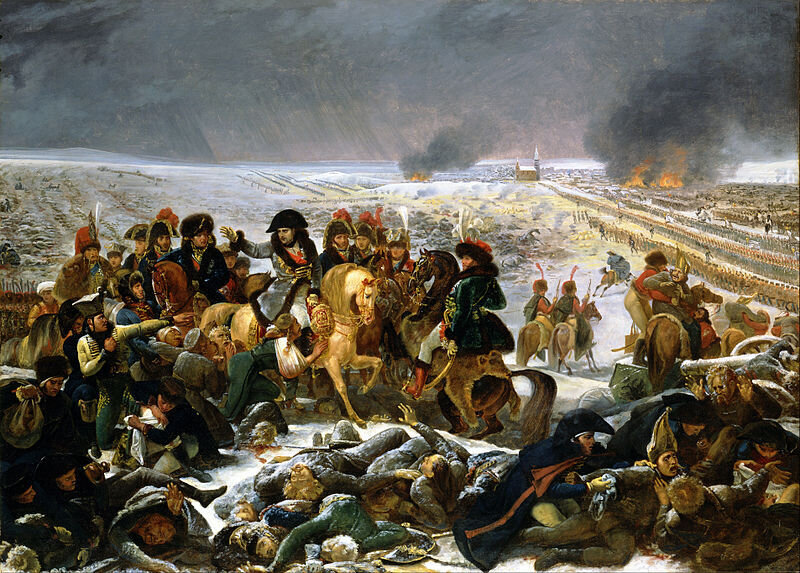
Mr. Flurry pointed out another spiritual lesson that we can learn from the Battle of Eylau. Napoleon understood that perseverance is very often one of the greatest keys to victory. “When two armies have dealt each other enormous wounds all day long,” Napoleon wrote, “the field has been won by the side which armored in constancy, refuses to quit” (page 444).
Tilsit and Spain
The summit between Russia, France and Prussia at the Prussian town of Tilsit was a unique and interesting moment. Napoleon spent a lot of time with Czar Alexander of Russia. The two men really seemed to click, which is interesting considering the intense conflict that would later arise between them. While he was living in exile on St. Helena years later, Napoleon commented that this summit was the happiest time of his life (page 460):
‘Yes, I was happy when I became First Consul, happy at the time of my marriage, and happy at the birth of the King of Rome. But then I did not feel perfectly confident of the security of my position. Perhaps I was happiest at Tilsit. I had just surmounted many vicissitudes, many anxieties, at Eylau for instance; and I found myself victorious, dictating laws, having emperors and kings pay me court.’
The Treaties of Tilsit divided much of Europe between France and Russia. Prussian King Frederick William was present at the summit as well, but he was sidelined by the two much greater powers of France and Russia. “When Frederick William arrived,” writes Roberts on page 457, “there was no salute, no welcome, and he was billeted at the house of the local miller. His position was not helped by the fact that both Napoleon and Alexander found him a pedantic, narrow-minded bore of limited conversation.”
Mr. Flurry then briefly mentioned Napoleon’s ill-advised venture into Spain in 1808. Page 484 emphasizes that “one of Napoleon’s primary reasons for invading Spain had been to try to secure the Spanish navy so that the dream of invading Britain could be resuscitated ….” Napoleon always dreamed of conquering Britain, but this plan failed yet again when Admiral François de Rosily-Mesros and six French ships were forced to surrender to the Spanish army on June 14.
Roberts mentions on page 487: “On September 7, Napoleon received more bad news, this time of Junot’s surrender to the British in Portugal …. [N]othing could disguise the fact that France had lost Portugal.” Napoleon admitted that the affairs in Spain and Portugal were detrimental to France: “I embarked pretty badly on this affair, I admit it. The immorality showed too obviously, the injustice was too cynical, and the whole of it remains very ugly” (page 497).
Napoleon’s Work Ethic
Mr. Flurry spotlighted more about Napoleon’s example of work ethic and drive. Roberts writes on page 470, “Everything in the organization of Napoleon’s palaces revolved around work.” When it came to dining, Napoleon himself “recognized that he was no gourmand. ‘If you want to dine well, dine with Cambacérès,’ he told General Thiébault during the consulate, ‘if you want to dine badly, dine with Lebrun; if you want to dine quickly, dine with me.’”
One of Napoleon’s most unique qualities was his ability to sleep whenever and wherever he needed to. On page 523, Roberts gives the example of Napoleon sleeping at the Battle of Wagram:
Astonishingly, Napoleon—who had spent sixty of the previous seventy-two hours in the saddle—took one of his ten-minute naps at about this point of the battle, a measure of his sangfroid as much as of his exhaustion. When he woke and saw that Markgrafneusiedl was still in Davout’s hands, he pronounced the battle won. Napoleon’s ability to sleep on a battlefield with 700 cannons firing is all the more remarkable considering that on or near the Raasdorf knoll that served as his headquarters no fewer than twenty-six staff officers were killed or wounded that day.
Napoleon’s skill in time management and prioritization is also notable. From page 471: “Napoleon was excellent at prioritization, dealing immediately with urgent matters, placing important but not urgent papers in a stack to be dealt with afterwards and throwing anything he considered unimportant onto the floor.” As hard as Napoleon himself worked, he worked his staff equally hard—yet they loved and respected him. “Although he worked them inordinately hard,” Roberts says on page 472, “Napoleon was considerate to his staff, who almost universally admired him.”
The Battle of Wagram and Napoleon’s Zenith
The battle at Aspern-Essling, as mentioned on page 516, was Napoleon’s first loss since Acre 10 years earlier, and only the fourth loss of his career so far. Mr. Flurry used this fact to illustrate how great of a military leader Napoleon was. Napoleon got revenge for his loss at Aspern-Essling through the battle of Wagram which Roberts draws special attention to on page 518:
Through intense planning and preparation, Napoleon got this enormous polyglot force—roughly the same number as attacked Normandy on D-Day—across one of Europe’s largest rivers into enemy territory on a single night, with all its horses, cannon, wagons, supplies and ammunition, and without losing a single man. It was an astonishing logistical achievement. … The battle they were about to fight was the largest in European history up to that point.
Napoleon Bonaparte’s empire reached its zenith in 1809-1810. Reflecting on his power at this time, Napoleon said: “There must be a superior power which dominates all the other powers, with enough authority to force them to live in harmony with one another—and France is best placed for that purpose” (page 527). Here we see more of the mentality of the Holy Roman Empire. Napoleon was reaching the peak of his power, and he expected nothing to stand in his way.
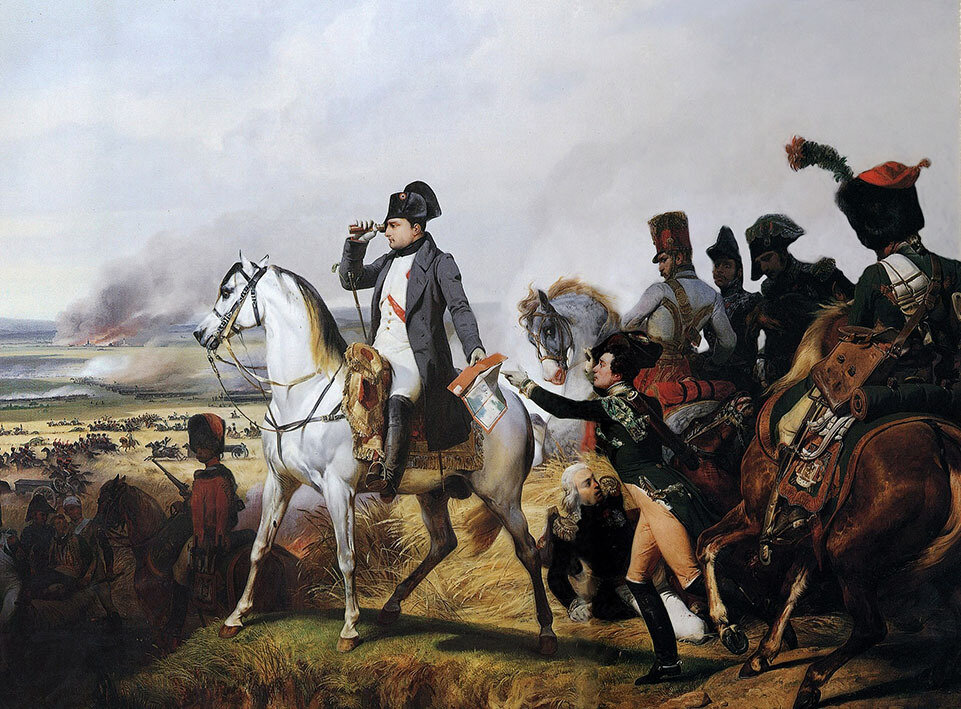
Bonaparte’s relations with the pope varied between cordial and respectful to openly hostile and antagonistic. At one point, the pope excommunicated Napoleon, and the emperor responded by having the pontiff arrested. Roberts quotes Napoleon’s words about the pope on page 531: “The Pope is a good man, but ignorant and fanatical.’” Roberts comments, “Those adjectives alas better describe Napoleon’s behavior towards the pontiff.”
At the same time that he was dealing with the pope, Napoleon began thinking a great deal about who would take over his kingdom when he died. Josephine was barren. Although Napoleon loved Josephine—he said later in life that he loved Josephine the best out of the many women he had relationships with—he divorced her on December 7, 1809, so that he could marry another woman and produce an heir to the throne. Mr. Flurry quoted from page 537 about the results of this divorce:
Ironically, although it was to get an imperial heir that Napoleon divorced Josephine, it would turn out to be her grandson, rather than any offspring of Napoleon, who would become the next emperor of France and her direct descendants who today sit on the thrones of Belgium, Denmark, Sweden, Norway and Luxembourg. His sit on none.
In the end, the middle-aged Napoleon married the 18-year-old Austrian Princess Marie Louise on April 1, 1810. The marriage was rocky, and as Roberts write on page 541, Bonaparte blamed his second wife for his downfall. Regarding the reasons for the decline of Napoleon’s empire, Roberts states on pages 550-551: “Most of these errors had been unforced, and many of his problems, we can now see, were self-inflicted. … None of his opponents could threaten the existence of the largest European empire since Ancient Rome, larger even [than] Charlemagne’s. Only Napoleon himself could do that.”
At last week’s meeting, Mr. Flurry concentrated on the Louisiana Purchase in 1803 and the coronation of Napoleon in December 1804. This week, he focused on Napoleon’s unique contribution to the art of war, his way with his troops in generating esprit de corps, and the epic Battle of Trafalgar.
Mr. Flurry began with remarks about God’s hand in the simultaneous rise of the fifth head of the Holy Roman Empire and the British Commonwealth. After the Industrial Revolution, Britain was always ahead of France in industry and power. As Napoleon would come to accept, he would never be able to conquer the British. Roberts wrote about the British industrial strength that Napoleon was up against on page 360:
In 1794, payments to allies amounted to 14 percent of British government revenue; twenty years later, with Wellington’s army actually inside France, it was still 14 percent, although the British economy had grown so considerably in the intervening period that this now represented £10 million, a vast sum. The heir to the French Revolution’s debs, Napoleon was fighting against a government fuelled by the Industrial Revolution’s profits, which it was willing to share round in support of its cause.
https://youtu.be/6vbS2uO8NdQ
The Art of War and Austerlitz
Roberts wrote on page 360 that “as time went on and death in battle claimed his four closest friends, there were fewer and fewer people who were close enough to Napoleon to tell him what he did not want to hear.” One man, Baron Louis de Bausset-Roquefort, really loved Napoleon. He said of Napoleon: “He was the only man in the world of whom it may be said without adulation, that the nearer you viewed him the greater he appeared” (page 361).
Above all, Napoleon was a great man in his military exploits. In the meeting, Mr. Furry shared a few quotes from Roberts about Napoleon’s unique contribution to the art of war. On page 366, Roberts wrote:
Napoleon pioneered an operational level of warfare that lies between strategy and tactics. His corps became the standard unit adopted by every European army by 1812, and which lasted until 1945. It was his unique contribution to the art of war, and its first use in 1805 can be regarded as heralding the birth of modern warfare.
Page 374 provides a quote from Napoleon’s soldiers after their success against the Austrians: “The Emperor has invented a new method of making war; he makes use only of our legs and our bayonets.” In his military maneuvers, Napoleon always focused on speed. He understood the value of time and was meticulous in planning out how it should be used on the battlefield. On page 376, Roberts mentioned a scenario where Murat, one of Napoleon’s generals, allowed an Austrian army to escape capture at Hollabrünn on November 15, an action that left Napoleon “in a fit of anger.” Napoleon said of Bernadotte, another general who disappointed him at the same time: “He made me lose one day and on one day depends on the fate of the world; I would not have let one man escape.”
Napoleon’s warfare was characterized by relentless forward motion, and he highly valued time. In our spiritual warfare, time is also of high value. We are better soldiers for Christ when we make good use of our time, especially as time is running out.
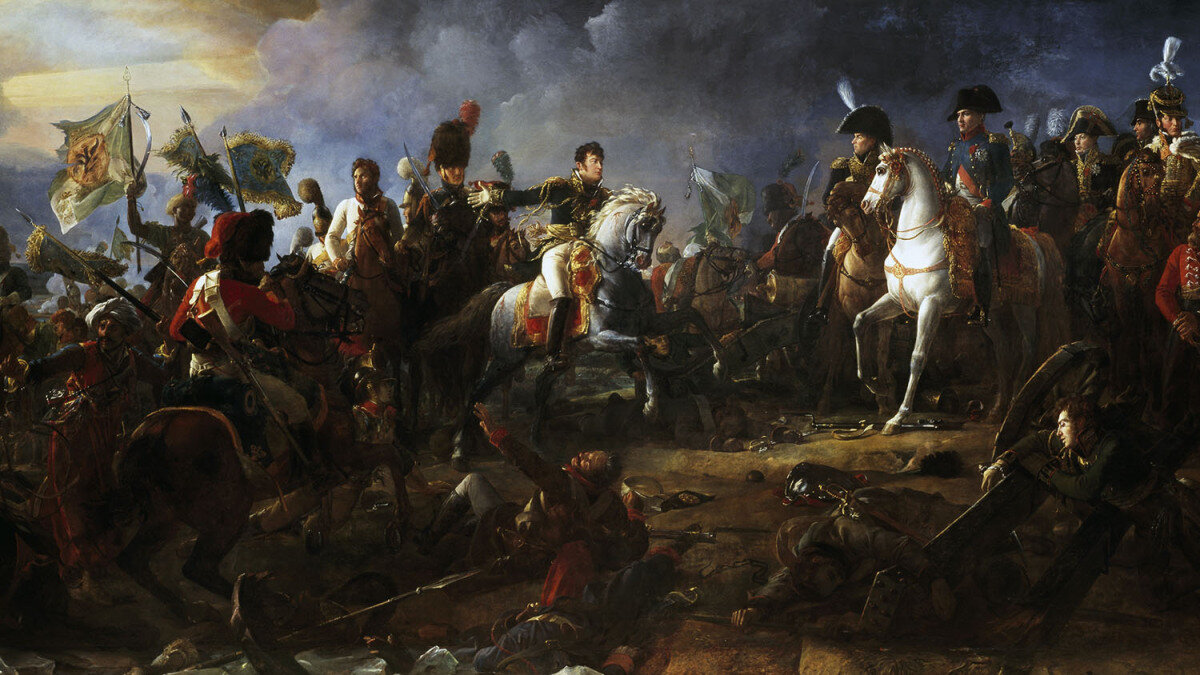
One of the most important aspects of Napoleon’s warfare, as Mr. Flurry has noted, was his use of esprit de corps. He associated with the troops often to boost their morale. On page 372, Roberts spotlighted just how close and personal Napoleon was with his men:
[O]ne appreciates the importance of the high morale and esprit de corps that Napoleon did so much to instill in his men. In the course of the fighting a grenadier of the former Army of Egypt lay wounded on his back in the pelting rain crying “Forwards!”, so Napoleon, who recognized him, took off his own cloak and threw it over him, saying: “Try to bring this back to me, and in exchange I will give you the decoration and the pension that you have so well deserved.”
Napoleon’s battle strategy was quite different from that of other generals of the time. Roberts quotes him on page 366: “To tell you the truth, the thing that made me gain so many battles was that the evening before a fight, instead of giving orders to extend our lines, I tried to converge all our forces on the point I wanted to attack. I massed them there.”
Napoleon was a fantastic general when it came to leading his men with focus and high morale, and he always engaged with the soldiers to bring their focus in line with his for the greatest possible chance at victory.
The Battle of Trafalgar
Mr. Flurry began the section on Trafalgar with a quote from a bbc article by Adam Lambert:
During the engagement at Trafalgar, on 21 October 1805, the Royal Navy annihilated the greatest threat to British security for 200 years, but lost Britain’s national hero in the process. Little wonder the battle transcended the mundane calculation of ships and men, victory and defeat. It guaranteed Britain’s control of the oceans, the basis of her global power for over a century.
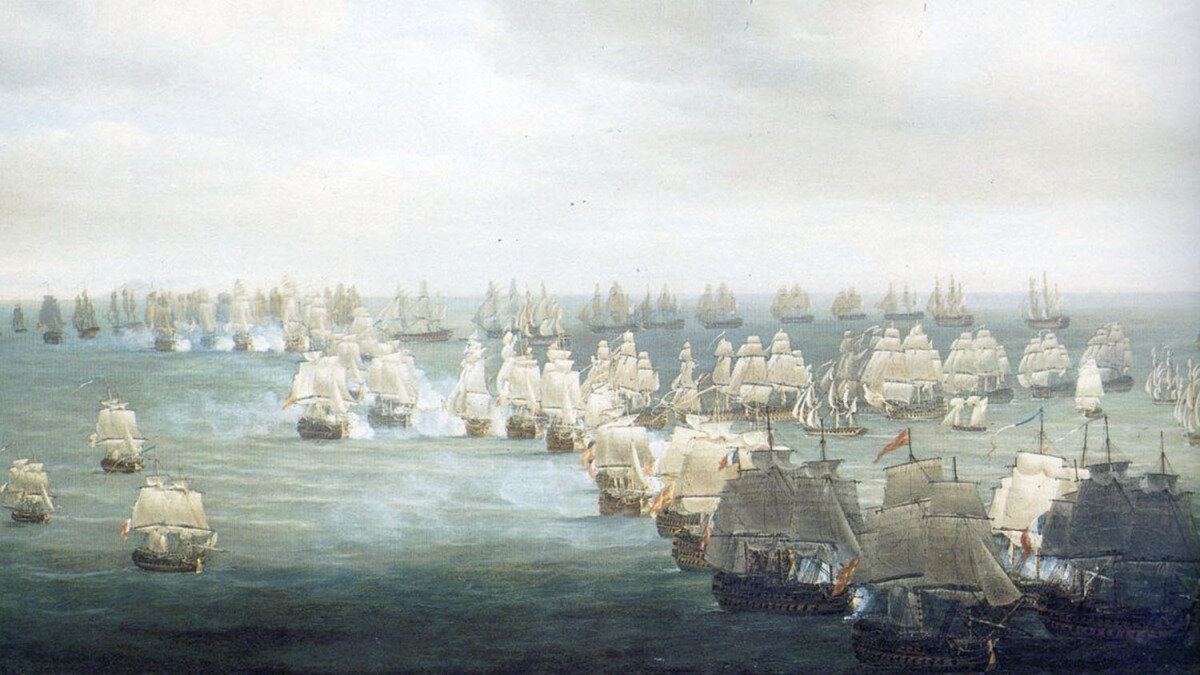
Roberts wrote on page 374: “The battle led to British naval dominance for over a century. As the philosopher Bertrand de Jouvenel put it, ‘Napoleon was master in Europe, but he was also a prisoner there.’”
On page 375, he wrote that “Napoleon’s mastery of land warfare was perfectly balanced by British mastery at sea, as the events of the autumn of 1805 were to demonstrate.”
The Battle of Trafalgar made Napoleon face a stark truth: He would never be able to conquer the British Navy. In conjunction with this point, Mr. Flurry shared a couple of quotes from David Howarth’s book Famous Sea Battles:
- Page 68—“The long blockade of all Napoleon’s ports in the years before Trafalgar was the greatest sustained and communal feat of seamanship there has ever been or ever will be.”
- Page 71—“Avoiding personal danger was not [Nelson’s] idea of duty, and he would not listen. On the contrary, danger always put him in the best of spirits.”
Lord Nelson’s prayer before the Battle of Trafalgar was a testimony of his character and a major reason why God gave Britain the victory that day. He prayed: “May the great God, whom I worship, grant to my country and for the benefit of Europe in general, a great and glorious victory …. For myself individually, I commit my life to him that made me; and may His blessing alight on my endeavors for serving my country faithfully. To him, I resign myself, and the just cause which is entrusted to me to defend. Amen” (William Manchester, The Last Lion, Vol. 2, page 513).
Admiral Nelson was a brilliant example of leadership, and he also fostered high morale in his troops. His last words are recorded as, “Thank God I have done my duty” (The Last Lion, Vol. 2, page 79).
At the end of the Battle of Trafalgar, the French and Spanish fleets lost 22 ships. Britain didn’t lose one! This was the most decisive naval battle of the Napoleonic Wars. The British had 1,666 casualties in the battle, while the French and Spanish had 13,781 men killed, wounded or captured. The Battle of Trafalgar was a miracle for Britain. After this battle, Napoleon knew that Britain was more powerful at sea and that he could never overpower it, although he did try to rebuild his fleet. Roberts wrote on page 393 that upon receiving a medal showing the French eagle holding the British lion in its talons, Napoleon screamed “How dare you say the French eagle stifles the English lion? I cannot launch upon the sea a single petty fishing boat but she’s captured by the English. In reality, it’s the lion that stifles the French eagle.”
Before asking for comments from the club, Mr. Flurry quoted from the 2002 version of The Former Prophets:
This was one of the greatest sea battles in history. It saved the British Empire. It appeared that Captain Nelson was outnumbered and outgunned. But was he? He turned to God with a beautiful prayer. He committed his life to his Creator.
Nelson sacrificed his life for the British Empire, and God gave him the victory.
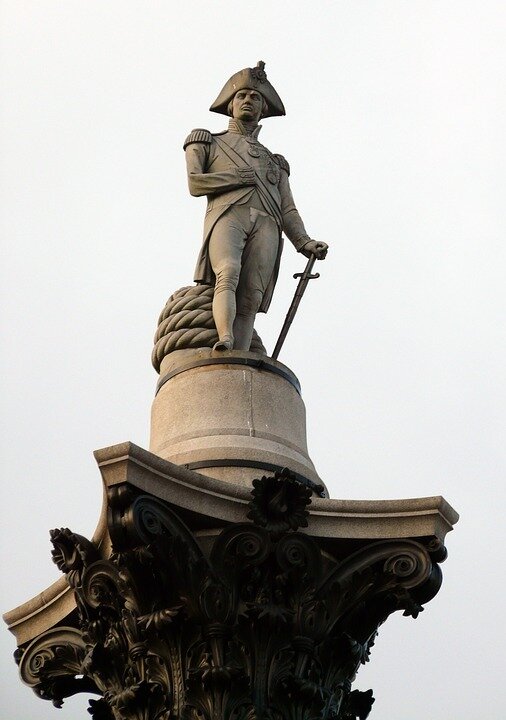
This historic battle is memorialized in London with Trafalgar Square, which was established in 1830, and Nelson’s Column, which was erected in 1843. The column is 170 feet tall and supports a statue of Nelson on top. Napoleon fought a good fight on land, but when it came to sea warfare, the British always got the best of him.
Mr. Flurry concluded the club by discussing a few miscellaneous points such as Napoleon’s quarrel with the pope (page 399), his ambitious work ethic in writing 2,679 letters in 1806, and a spiritual parallel with Napoleon’s love of empire. Napoleon loved building and expanding his empire. As God’s people, we should be far more passionate about expanding God’s soon-coming empire than Napoleon was about his physical empire.
MEETING 4 | February 7, 2019
At last week’s book club, Mr. Flurry explored lessons from the warfare of Napoleon Bonaparte. He also drew special attention to chapter 12 and Napoleon’s union with the Roman Catholic Church. Last night, we concentrated on two important topics from this week’s reading: the Louisiana Purchase in 1803 and the coronation of Napoleon in December 1804. Both events were prophetically significant.
Mr. Flurry began by briefly recalling the bombing plot against Napoleon on his carriage ride to a Paris opera house in December 1800. Roberts wrote on page 287 that this bombing “killed five people (including the young girl holding the horse) and injured twenty-six.” However, this didn’t stop Napoleon from attending and enjoying the opera that night. When he arrived at the opera house, he said to his wife, “Josephine, those rascals wanted to blow me up,” and then calmly asked for a program for the oratorio that they were about to watch.
The assassination of Russia’s Czar Paul i on March 23, 1801, as Mr. Flurry next discussed, was a significant moment in Napoleon’s life. Bonaparte had been on good terms with the czar and was actually quite close to him personally; Roberts says on page 295, “The assassination of Czar Paul i on March 23 came as a blow to Napoleon, who is said to have cried out in rage at the news.” Roberts also wrote on page 296 that Alexander, Paul I’s successor, “ultimately did more than any other individual to bring about Napoleon’s downfall,” and that “his emergence on to the European scene with his father’s assassination was a seminal moment.” Czar Alexander was more pro-British than Czar Paul i; under his leadership, Russia left the League of Armed Neutrality. In essence, the assassination of Paul i was when Napoleon lost his close ties with Russia.
https://www.youtube.com/watch?v=n_wxYHow2m0
Amiens and the Louisiana Purchase
On October 1, 1801, Napoleon made a peace treaty with Britain. Under the treaty, Britain gained part of Italy and Egypt, and France regained the parts of its overseas empire that Britain had held since 1793. “The treaty was a massive diplomatic coup, since Egypt was being evacuated anyway after Menou’s defeat, as the British discovered on October 2, the very day after its signature,” wrote Roberts on page 298. He also wrote this on page 307:
On Thursday, March 25, 1802, after nearly six months of negotiations, the Anglo-French peace treaty, to which France’s allies Spain and Holland were also signatories, was finally signed in the hôtel de ville at Amiens. … The provisions of Amiens were substantially similar to the preliminary treaty, with Britain promising to leave Malta and declare it a free port within three months of ratification, returning the island to the Knights of St John, and to cede its control over Pondicherry, and France regaining her colonies for the price of evacuating Naples, Taranto and those parts of the Papal States such as Ancona that were not in the Italian Republic.
Napoleon was playing the role of a pacifist, but it was only temporary. He would have aggressive correspondence with Lord Whitworth of Britain in March 1803 that would eventually incite Britain to declare war on France. “The English want war,” Napoleon said, “but if they are the first to draw the sword, I will be the last to return it to the scabbard. They don’t respect treaties” (page 321). In reality, neither did Napoleon.
Mr. Flurry noted that even though Napoleon made gains through peace treaties, he recognized that France would never match the industrial strength of Britain. Roberts wrote on page 315: “Yet by the end of his reign, France had reached only the level of industrialization that Britain had enjoyed in 1780 …. But for all Napoleon’s efforts, and especially once war broke out again, French industrialization was only ever on a small scale compared to that of the powerhouse across the Channel.” A little further down on page 315, Roberts wrote that “Napoleon had managed greatly to increase confidence in France’s finances and in her ability to honor her government’s bonds, but even so they never managed to match Britain’s in this period. At his best, he was forced to borrow at higher rates than Britain at its worst.”
Neither Britain nor France abided by the terms of the Amiens treaty for very long. Within a year of the Peace of Amiens, Britain had declared war on France. Just before Britain declared war, Napoleon made a momentous decision to sell what the Spaniards sold to him only one year earlier—the Louisiana territory in North America. Napoleon offered the 820,000 acres of land to the United States for $15 million dollars, or about three cents an acre. Mr. Flurry commented that U.S. President Thomas Jefferson’s decision to agree to the purchase was hugely important because “America would never have been able to become a continental power were it not for the Louisiana Purchase.” The land deal doubled the size of the United States, giving it access to the critical port of New Orleans, the entire Mississipi River basin, and the extremely rich farmland in the middle of America that would soon become its breadbasket. This purchase contributed immensely to America becoming a superpower.
Mr. Flurry then provided a few slides on the Louisiana Purchase to draw attention to its significance to America.
His first was from an article entitled “The Deadly Dangerous U.S.-Cuba Deal“ by Trumpet editor in chief Gerald Flurry:
For Napoleon, Haiti served as the basis of his empire in the New World. When he lost Haiti in a slave revolt, he gave up his ambition in the Western Hemisphere and sold off a massive chunk of territory in the Louisiana Purchase.
Mr. Flurry then quoted Dumas Malone’s book, Jefferson the President: First Term, 1801-1805:
This epoch-making agreement with France was owing to a concurrence of extraordinarily fortunate circumstances—fortunate, that is, from the American point of view.
President Jefferson, who agreed to the purchase, said the following:
While the property and sovereignty of the Mississippi and its waters secure an independent outlet for the produce of the western states, and an uncontrolled navigation through their whole course, free from collision with other powers and the dangers to our peace from that source, the fertility of the country, its climate an extent, promise in due season important aids to our treasury, an ample provision for our posterity, and a widespread field for the blessings of freedom and equal laws.
On page 325, Roberts included a quote from Napoleon from the time of the Louisiana Purchase: “I have just given to England a maritime rival that sooner or later will humble her pride.” He was right; only a few years later, America went to war against Britain in 1812 over British violations of U.S. maritime rights. Herbert W. Armstrong wrote the following in a co-worker letter dated June 15, 1984, regarding the importance of the Louisiana Purchase:
Until 1800 these nations had been small and unimportant in the world. But suddenly, in a.d. 1800, London became the financial capital of the world. The United States had been 13 original colonies with a few territories added. In 1803, the Louisiana Purchase was acquired from France, and the United States almost suddenly sprouted up into—by 1918—the greatest, wealthiest and most powerful nation on earth.
Drawing on this statement, Mr. Flurry further highlighted how God used the Holy Roman Empire to build up America with the Louisiana Purchase.
The Coronation of Napoleon the Great
After some club discussion on the Louisiana Purchase, Mr. Flurry expounded on the coronation of Napoleon.
The coronation occurred on Sunday, December 2, 1804. This was a monumental occasion that Roberts describes on the last few pages of chapter 15. On page 355, he wrote that “Napoleon’s crowning of himself was the ultimate triumph of the self-made man, and in one way a defining moment of the Enlightenment. It was also fundamentally honest: he had indeed got there through his own efforts.”
Mr. Flurry quoted what Roberts wrote on page 355 about the two crowns Napoleon wore: “Napoleon had two crowns during the coronation: the first was a golden laurel-wreath one that he entered the cathedral wearing which was meant to evoke the Roman Empire and which he wore throughout; the second was a replica of Charlemagne’s crown, which had to be specially made because … the Austrians wouldn’t lend him Charlemagne’s.” This really shows how Napoleon saw himself—as a successor of the Holy Roman Empire.
Before opening it up for discussion, Mr. Flurry gave two additional quotes for the night. The penultimate quote was from page 70 of E.E.Y. Hale’s book Napoleon and the Pope:
In the same way the regalia carried by the emperor would be a mixture; some would be articles supposed to have been carried by Charlemagne at his coronation, some would be modern copies; most of the originals were unfortunately in the keeping of the Holy Roman Emperor, who could hardly be approached for the loan of them. The pope was by no means pleased with all the arrangements. It had been clearly understood at Rome that he was to crown as well as to anoint the emperor, but now it seemed that Napoleon was unwilling to receive the crown from anybody’s hands; he would place it on his own head, only allowing the pope to bless it first.
Mr. Flurry finished with a quote from The Holy Roman Empire in Prophecy, page 122. It reminds us of the importance religion played in the the fifth head of the Holy Roman Empire:
Napoleon may not have been an ardent Catholic like Charlemagne, but he knew history. He knew that to achieve his dream of a united European empire, he needed the sanction of the Roman Catholic Church. And the church, after suffering major setbacks during the Reformation and French Revolution, saw Napoleon as a means of restoring its place and power.
MEETING 3 | January 31, 2019
At last week’s meeting, Mr. Flurry discussed esprit de corps and some of the personal lessons we can draw from the life of Napoleon Bonaparte as we follow Paul’s admonition in 1 Timothy 1:18 to “war a good warfare.” Last night, Mr. Flurry reiterated that admonition from Paul and explored more lessons from the warfare and tactics of Napoleon. He also drew special attention to chapter 12 of Andrew Roberts’ book and Napoleon’s union with the Roman Catholic Church.
This quote from How to Be an Overcomer reminds us that there are personal lessons to take from Bonaparte:
Napoleon Bonaparte was a ruthless dictator. But he was also one of the most phenomenally successful military leaders in history. Many great military men have studied him in detail, including Winston Churchill. His life contains principles and examples we can emulate in order to better fight our spiritual war.
Mr. Flurry began by spotlighting a few scriptures regarding our spiritual warfare:
- “And an host was given him against the daily sacrifice by reason of transgression, and it cast down the truth to the ground; and it practised, and prospered.”—Daniel 8:12
- “For it became him, for whom are all things, and by whom are all things, in bringing many sons unto glory, to make the captain of their salvation perfect through sufferings.”—Hebrews 2:10
- “Put on the whole armour of God, that ye may be able to stand against the wiles of the devil.”—Ephesians 6:11
- “Fight the good fight of faith, lay hold on eternal life, whereunto thou art also called, and hast professed a good profession before many witnesses.”—1 Timothy 6:12
Then Mr. Flurry read a quote from the Micah booklet:
[The Laodiceans] are too weak to fight for God. They no longer have God’s power. Then they become spiritual dupes and are used by Satan in his war against God. They have forgotten that God called us into a great spiritual war! We are soldiers (2 Timothy 2), and soldiers must fight—even die, if necessary. These weak Laodiceans would rather surrender to Satan than fight for God’s truth and prophecy.
https://www.youtube.com/watch?v=2FR2I11N350&feature=youtu.be
First Consul
In 1799, following his return from Egypt, Napoleon masterminded a coup that ended with him becoming First Consul of France. The way he navigated his first 15 weeks as First Consul was masterful. On page 156 of Napoleon the Great, Roberts writes,”Placing oneself in the limelight while seeming modestly to edge away from it is one of the most skillful of all political moves, and Napoleon had mastered it perfectly.” Napoleon was only 30 when he became First Consul, but he shrewdly maneuvered his way to dictator status.
Bonaparte’s incredible ability to manipulate enabled him to advance his agenda with terrific speed. On pages 239-240, Roberts notes that he even manipulated the vote tally in his favor for the passing of the Constitution of the Year viii:
- Page 239—“On February 7 Lucien formally announced the results of the plebiscite, asserting that that 3,011,007 Frenchmen had voted in favor of the Constitution of the Year viii and only 1,562 against.”
- Page 240—“Lucien’s fiddling of the figures provides a perfect insight into one of the most characteristic aspects of the Napoleonic story. Napoleon was always going to win by a huge landslide, yet the Bonapartists simply couldn’t resist exaggerating even those numbers ….”
On page 240, Roberts points out that half the French electorate was illiterate. This meant that mayors, many of whom were in the pocket of Napoleon, filled in their ballots for them. Mr. Flurry noted that this is a key difference between the 5th and 7th heads of the Holy Roman Empire. The leader of the 7th head of the Holy Roman Empire will have to be much more crafty and sophisticated since people today are much better educated than they were in the early 19th century. As Daniel 11:21 says, “And in his estate shall stand up a vile person, to whom they shall not give the honour of the kingdom: but he shall come in peaceably, and obtain the kingdom by flatteries.”
Napoleon’s first four months as First Consul were exceptionally productive. Roberts sums up the noteworthy accomplishments on page 249 of his book:
“Napoleon had effectively ended the French Revolution, seen off the Abbé Sieyès, given France a new constitution, established her finances on a sound footing, muzzled the opposition press, started to end both rural brigandage and the long-running war in the Vendée, set up a Senate, Tribunate, Legislative Body and Conseil d’État, appointed a talented government regardless of past political affiliations, rebuffed the Bourbons, made spurned peace offers to Britain and Austria, won a plebiscite by a landslide (even accounting for the fraud), reorganized French local government and inaugurated the Banque de France.”
The Battle of Marengo
On June 14, 1800, the Grande Armée led by Napoleon fought Austrian forces in the Battle of Marengo. This famous battle was Napoleon’s first great victory as First Consul, but it came very close to being a devastating defeat. Some might say it was a miraculous victory. Roberts notes two standout aspects of “sheer good luck” on page 269 that made his victory at Marengo possible:
For all his military genius, intellectual capacity, administrative ability and plain hard work, one should not underestimate the part that sheer good luck played in Napoleon’s career. In May 1800 there was a gap in the weather for crossing the Alps, and in June the rains slowed Desaix’s march away from Marengo enough so that he could return to the battlefield in time to save his commander-in-chief.
When it came to war, Napoleon believed, “If you make war, employ severity and activity; it is the only means by which you make it shorter, and consequently less deplorable for humanity” (page 242). Bonaparte was ruthless but effective in his military endeavors. In our Christian lives, we too must employ severity in our war against sin.
Using Religion for Political Ends
Napoleon once remarked, “If I ruled a people of Jews, I would rebuild the Temple of Solomon!” (Page 272). His use of religion in politics empowered and popularized him. After discussing the Battle of Marengo, Mr. Flurry segued into chapter 12 and discussed how Napoleon used religion to achieve political ends. Mr. Flurry accentuated this fact with a few quotes from The Holy Roman Empire in Prophecy.
- Page 118—“’Napoleon did not intend to serve religion, but to use it,’ writes John Vidmar in The Catholic Church Through the Ages: A History.”
- Page 119—“… Napoleon came to the same conclusion that Justinian, Charlemagne, Otto and the Habsburgs had all come to before him: To have maximum power, he needed moral and spiritual cover provided by the Catholic Church.”
- Page 119—“To make peace with the church, Napoleon signed the Concordat of [July] 1801 with Pius vii. This agreement reversed a lot of the setbacks the revolution had inflicted upon the church. It proclaimed that Catholicism was the religion of the great majority of the French citizens. It guaranteed Catholics freedom of religion—but also brought that religion under some state control, stating that bishops had to swear loyalty to the government.”
- Page 122—“Napoleon may not have been an ardent Catholic like Charlemagne, but he knew history. He knew that to achieve his dream of a united European empire, he needed the sanction of the Roman Catholic Church. And the church, after suffering major setbacks during the Reformation and French Revolution, saw Napoleon as a means of restoring its place and power.”
Recognizing the significance religion played in people’s lives in 19th-century Europe, Napoleon utilized it skillfully. On page 272, Roberts quotes Napoleon saying, “The idea of God is very useful to maintain good order, to keep men in the path of virtue and to keep them from crime.” He also said, “To robbers and galley slaves, physical restrictions are imposed; to enlightened people, moral ones.”
On page 275, Napoleon told the legislature in 1803 that the reintroduction of religion was having the desired effect on the French populace: “Children listen with more docility to the voice of their parents, youth is more submissive to the authority of the magistrate, and the conscription is now effected in places where its very name used to arouse resistance.” As Roberts notes, this illustrates that Napoleon “primarily saw religious reconciliation in terms of propaganda and public discipline.”
Napoleon built his empire using the Roman Catholic Church! He once said, “I am the successor, not of Louis xvi, but of Charlemagne.” He clearly understood the empirical heritage he was following. Roberts writes on page 276 that Napoleon resurrected an empire like Justinian’s through the Code Napoléon: “Essentially a compromise between Roman and common law, the Code Napoléon consisted of a reasoned and harmonious body of laws that were to be the same across all territories administered by France, for the first time since the Emperor Justinian.”
The final discussion among the club members included: Napoleon’s interaction with the Catholic Church and how it fits in with Bible prophecy; the spirit Napoleon had during his time as First Consul; and how much he valued education, which he saw as “the most important of all the institutions, since everything depends on it, the present and the future” (page 280).
MEETING 2 | January 24, 2019
In the first book club, Mr. Flurry explored the prophetic context of Napoleon Bonaparte’s rise to power, emphasizing that Napoleonic France was the fifth head of the prophesied Holy Roman Empire. In this week’s meeting, Mr. Flurry focused on some of the lessons that we can learn from this great military general, which we can apply to our personal spiritual battles as we “war a good warfare” (1 Timothy 1:18).
Mr. Flurry began with a few quotes from his father’s book How to Be an Overcomer, including this quote from page 73:
Napoleon Bonaparte was a ruthless dictator. But he was also one of the most phenomenally successful military leaders in history. Many great military men have studied him in detail, including Winston Churchill. His life contains principles and examples we can emulate in order to better fight our spiritual war.
Mr. Gerald Flurry also wrote in The Former Prophets: “Napoleon Bonaparte said that if you want to be a great general, you must study the great generals of the past. That is good advice for us spiritually as well. Bible history is the greatest history of all because it’s God’s history.” Mr. Flurry reviewed these quotes and then tied in some scriptures:
- “This charge I commit unto thee, son Timothy, according to the prophecies which went before on thee, that thou by them mightest war a good warfare.”—1 Timothy 1:18
- “Put on the whole armour of God, that ye may be able to stand against the wiles of the devil.”—Ephesians 6:11
https://www.youtube.com/watch?v=VVoEILr9DOY&feature=youtu.be
French Revolution
Napoleon would probably have gained distinction in any era of world history because of his natural abilities, but his rise at the time of the French Revolution is a remarkable instance of being in the right place at the right time. Roberts wrote on page 29: “[T]he epoch when he first entered on his career was particularly fitted to facilitate his elevation.” The French Revolution helped set the stage for Napoleon’s arrival.
Napoleon supported the downfall of the monarchy, even though he was an aristocrat himself. Roberts wrote: “Despite hating mobs and technically being a nobleman, Napoleon welcomed the Revolution. … He embraced its anti-clericalism and did not mind the weakening of a monarchy for which he had no particular respect” (page 29).
- September 5, 1793, to July 27, 1794—Thousands of French noblemen and suspected royalists were executed during the Reign of Terror (page 44).
- June 11, 1793—The Bonaparte family left Corsica for France. Napoleon knew his future was in France, so he and his family settled in the coastal town of Toulon (pages 44-45).
- Pages 46-51—Filled with youthful ambition, Napoleon took command of the Toulon artillery at the age of 24. His victory against the Anglo-Spanish fleet at Toulon was a seminal moment in his early career. Roberts wrote that the victory “‘gave him confidence in himself.’ He had shown that he could be trusted with command” (page 51).
The Italian Campaign
Following his victory at the siege of Toulon, Napoleon returned to Paris, where he worked for the Historical and Topographical Bureau of the War Ministry. Here, the young Bonaparte worked with some of the greatest military minds in France and received high-level training. On Feb. 7, 1794, the ambitious 24-year-old was given command of the Italian army.
Just 48 hours prior to leaving for his campaign in Italy, Napoleon married his first wife, Josephine de Beauharnais (page 72). Though she had a lengthy affair while he was away in Egypt, Napoleon did not desert her when he returned to France. Roberts says on page 207 that “afterwards she was faithful to him, though he certainly wasn’t to her.” Roberts also wrote on page 208, “The story of Napoleon and Josephine is thus certainly not the romantic Romeo-and-Juliet love story of legend, but something subtler, more interesting and, in its way, no less admirable.”
Between March 1796 and April 1797, Bonaparte was with his army in Italy, warring primarily with the Austrians and winning victory after victory. Outnumbered 60,000 to 40,000, Napoleon relied on speed and deception to gain an advantage over the enemy. He made detailed plans and moved quickly to try to catch enemy troops off guard (pages 78 and 85).
In this part of the club, Mr. Flurry quoted How to Be an Overcomer again: “Napoleon put a premium on speed and mobility. His enemies wanted to wage war in a more leisurely fashion. That is a big reason they were so often his victims. Waging war casually will get you killed.”
There are clear spiritual parallels to Napoleon’s strategy, as Mr. Gerald Flurry explains in the booklet. In Hebrews 12:1, the Apostle Paul wrote: “Wherefore seeing we also are compassed about with so great a cloud of witnesses, let us lay aside every weight, and the sin which doth so easily beset us, and let us run with patience the race that is set before us.”
Mr. Stephen Flurry also listed some other lessons we can learn from Napoleon’s tactics in war:
- Napoleon had an incredible capacity for hard work. “In the nine months between his arrival in Nice and the end of 1796 he sent more than eight hundred letters and dispatches, covering everything from where drummer-boys should stand in parades to the conditions under which the ‘Marseillaise’ should be played” (page 79).
- Napoleon valued information and knowledge. Before every campaign, he studied literally every ounce of information he could find. “In the nine days between receiving the appointment and leaving for his headquarters in Nice on March 11, Napoleon asked for every book, map and atlas on Italy that the war ministry could provide” (pages 72, 75 and 133).
- “Napoleon was extremely thorough in all his planning; as little as possible was left to chance” (The Campaigns of Napoleon by David Chandler).
- When necessary, Napoleon was capable of inflicting total destruction. “If you make war … wage it with energy and severity; it is the only means of making it shorter and consequently less deplorable for mankind” (page 99).
- During this campaign, Napoleon had 12 victories in 12 months! His fame and popularity increased exponentially after this campaign. Roberts wrote that “although Barras and Carnot recognized his undeniable military capacity, all the Directors feared how he might use his growing popularity with the people once the Italian campaign was over” (page 117).
Military Strategy and Esprit de Corps
Napoleon was absolutely brilliant at fostering high morale in his troops, or esprit de corps. Mr. Flurry quoted How to Be an Overcomer:
‘Napoleon was always aware of the vital importance of morale in warfare,’ Chandler wrote, ‘and another of his best-known maxims declared that in war, the morale is to the physical as three is to one.’ With high morale, a general will win three times as many battles!
If you really have the spirit God wants you to have, the high morale, you are going to win three battles where you would normally win one. The morale that Napoleon prized is sometimes called esprit de corps—the spirit and enthusiasm of the group, loyalty to each other and to the cause.
Mr. Gerald Flurry writes later in the booklet, “[Napoleon’s] speeches lit a fire in his men to fight. In that respect very few leaders have ever reached Napoleon’s level.”
As Roberts shows throughout his book, one of Napoleon’s most outstanding strengths as a leader was his ability to foster esprit de corps within the troops that followed him to battle. He had a special ability to make common soldiers feel like they were part of something bigger than themselves—that they were making history. Pages 134-137 contain some details about how he did this. He was personable with the soldiers on an individual level, engaging in friendly banter with them and allowing battalions that particularly distinguished themselves to embroider slogans on their flags.
- “In war,” Napoleon wrote, “morale factors account for three-quarters of the whole; relative material strength accounts for only one-quarter.”
- Page 134—“He believed above all in the maintenance of strong esprit de corps. Although this combination of spirit and pride is by nature intangible, he knew that an army that had high morale could achieve wonders.”
In How to Be an Overcomer, Mr. Gerald Flurry writes:
That is definitely an example we should seek to emulate in our spiritual warfare. The way for us to develop high morale is to get our hearts into God’s work. The question is, what prevents you from doing that fully? What is holding you back? This is God’s Work!—what holds you back from absolutely throwing yourself into it? We should all have high morale—and inspire that in others. Do you inspire others to have high morale, or do you drag them down?
The Bible contains many verses that can boost our spiritual morale:
- “And I say also unto thee, That thou art Peter, and upon this rock I will build my church; and the gates of hell shall not prevail against it.” –Matthew 16:18
- “Now thanks be unto God, which always causeth us to triumph in Christ, and maketh manifest the savour of his knowledge by us in every place.” –2 Corinthians 2:14
- “For by one Spirit are we all baptized into one body, whether we be Jews or Gentiles, whether we be bond or free; and have been all made to drink into one Spirit. For the body is not one member, but many.” –1 Corinthians 12:13-14
- “Not forsaking the assembling of ourselves together, as the manner of some is; but exhorting one another: and so much the more, as ye see the day approaching.” –Hebrews 10:25
Napoleon always reminded his soldiers that they were making history. God’s Church today is also making great history! We should remember Napoleon’s example and apply his strategy of high morale.
Egypt Campaign and the Coup
This week’s meeting finished with a brief discussion about Napoleon’s relatively short campaign in Egypt and his return to Paris, where he masterminded the coup that resulted in him becoming First Consul of France. Mr. Flurry emphasized that Napoleon wanted the Egypt campaign to be a cultural and scientific experience, not just a war of conquest. Roberts emphasizes this aspect of Napoleon’s campaigns, noting that he brought a group of scientists and scholars with him on the campaign so they could learn as much about Egypt as possible (pages 165, 203).
MEETING 1 | January 17, 2019
When Andrew Roberts published Napoleon the Great in 2014, it triggered a debate within the scholarly community: Was Napoleon really a “great” emperor? Or was he merely a cruel despot who romanticized war and conquest?
There is truth on both sides of the debate. Roberts, as you can tell by looking at the title of his book, believes Napoleon was a great man and a great leader. In fact, Roberts believes that Napoleon was the greatest figure of the 19th century—the man who saved France and transformed the West. Many share this view, including Winston Churchill.
Before we dive into the details of Napoleon’s life, however, it is important to take a step back and get the prophetic context. Napoleon was on the scene during one of the most prophetically significant times in world history. He played a critical role in the fulfillment of two towering biblical prophecies.
First, Napoleon was the architect of the fifth resurrection of the Holy Roman Empire. The Bible has a lot to say about the Holy Roman Empire; you can read about it in Daniel 7 and Revelation 13 and 17. In book club, Mr. Flurry pointed members to Who and What Is the Prophetic Beast? and The Holy Roman Empire in Prophecy, which explore the prophecies about the Holy Roman Empire in detail. In 1804, during a ceremony in Notre Dame Cathedral in Paris, 35-year-old Napoleon took the crown from the pope and placed it on his own head—boldly crowning himself emperor of Europe!
As we read Napoleon the Great, it is important to never lose sight of who Napoleon was or the deeply evil system he thrived in. The man was brilliant and impressive, but he was also a monster. The Bible refers to the Holy Roman Empire as a “beast.” Mr. Flurry referenced his father’s booklet Daniel Unlocks Revelation, in which Mr. Gerald Flurry stated that the Holy Roman Empire is Satan’s number one tool.
Mr. Flurry quoted a 2016 article written by his father, “The Spirit of Charlemagne Is Alive in Europe”:
Napoleon ruled 200 years ago. Charlemagne ruled 1,200 years ago. Today, most people romanticize and glorify the reigns of these two European emperors. But they forget the bloodshed. They forget the violence these European rulers brought about. They blot out that bloody, bloody history. The Bible foretells that one more resurrection of this empire is ahead of us. … And what spirit will that leader have? The same spirit embraced by Hitler, by Napoleon, by Charlemagne.
Second, Napoleon was on the scene when God began fulfilling His promise of national greatness to Abraham (Genesis 12, 17, 22). That promise was passed down through Abraham’s family line to Joseph’s two sons, Ephraim and Manasseh—the forefathers of the modern nations of Britain and America. Because of ancient Israel’s sins, the fulfillment of those promises was withheld for 2,520 years (Leviticus 26:18), until the beginning of the 19th century. Between 1800 and 1803, wrote Mr. Armstrong in The United States and Britain in Prophecy, these “two birthright peoples suddenly burst forth as the greatest world powers in all history!”
Amazingly, Napoleon played a key role in the stunning ascension of both Britain and America. In 1803, Napoleon sold approximately 828,000 square miles of land west of the Mississippi River to the United States. This Louisiana Purchase was one of the largest, most inexpensive and peaceful acquisitions of land in history. That choice land—America’s breadbasket and home of the vital Mississippi River basin—helped propel America to its status as the greatest superpower in history. Napoleon himself recognized what he had done for America. Following the sale, he wrote: “This accession of territory affirms forever the power of the United States, and I have given England a maritime rival who sooner or later will humble her pride.”
In 1805, Napoleon suffered a devastating loss to Adm. Horatio Nelson and the British Navy at the Battle of Trafalgar. The British victory cemented Britain’s prophesied position as the ruler of the waves and helped increase its prestige around the world. Napoleon was finally defeated at the Battle of Waterloo in June 1815. His departure from the scene left Britain as the unrivaled power of Europe.
It is also interesting to think about the convergence of these two prophecies. Satan the devil knew about God’s promise to Abraham. He knew about the 2,520-year prophecy. He knew that starting in 1800, God would begin blessing the modern descendants of Ephraim and Manasseh, forging Britain into the greatest empire ever and America into the greatest single nation in the world. If you think about it, Napoleon and the fifth resurrection of the Holy Roman Empire was Satan’s attempt to prevent God from fulfilling His promise to Abraham.
But the devil’s best efforts backfired spectacularly. The very tool that he created to destroy Ephraim and Manasseh actually helped forge these nations into truly exceptional powers!
https://youtu.be/fXumRHTwMxQ
Napoleon, Churchill and Empire
Winston Churchill was fascinated by Napoleon and considered him one of the greatest men in world history. In Visions of Glory, William Manchester noted that Churchill regretted not writing biographies of Napoleon and Caesar. Mr. Flurry played a clip of Andrew Roberts discussing Churchill’s view of Napoleon and why Churchill might have been drawn to the French emperor:
I believe the greatest man of the 20th century, Winston Churchill, was profoundly influenced by the greatest man of the 19th century, Napoleon Bonaparte. Indeed, insofar as Winston Churchill had role models in life, they were his father Lord Randolph and Napoleon Bonaparte. It was Winston Churchill who noted that his parents met at Cowes on the Isle of Wight, on the 15th of August, 1873, which was Napoleon’s 104th birthday. Churchill admired the way that Napoleon started his successful military career early in life, despite—or more probably because of—the fact that Napoleon’s father had died when he was just 15, not much younger than Churchill was when his father died.
Winston Churchill said that “Napoleon was the greatest man of action since Julius Caesar.” And I believe his life is also a standing rebuke to people who don’t believe in the “great man theory” of history and who think that history is all created—like the Marxists do—by vast impersonal forces. Standing against that is the life and career of Napoleon.
Churchill hated it when people compared Hitler to Napoleon. He wrote: “It seems an insult to the great emperor and warrior to connect him in any way with a squalid caucus boss and butcher.”
After discussing the love that Churchill and Napoleon had for empire, Mr. Flurry reminded book club members of his father’s messages about empire and how important it is that we have a deep love for the God Family Empire. He played a clip from a sermon Mr. Gerald Flurry gave in September 2018:
Guttenberg’s going around saying, “Look, we need more passion for the Holy Roman Empire!” Well, I think … we all (I’m talking about myself, too), but we need more passion for God’s throne! We need more passion for this! We need deeper understanding for this! Read that booklet on the new throne of David again and again, and see what is really there. And again read it! I’m telling you, brethren, it is marvelous revelation from God! And we ought to thank God for it every week at least, and every day would be a good way to praise Him for what He’s doing. But what kind of a passion do you and I have? This is about the salvation of the world! That’s what it’s all about!
Like Napoleon and Churchill, true Christians today must fight and struggle to enter the God Family Empire.
- “To him that overcometh will I grant to sit with me in my throne, even as I also overcame, and am set down with my Father in his throne.” –Revelation 3:21
- “Fight the good fight of faith, lay hold on eternal life ….” –1 Timothy 6:12
- “Strive to enter in at the strait gate ….” –Luke 13:24
- “[M]ortify [kill] the deeds of the body ….” –Romans 8:13
- “I therefore so run, not as uncertainly; so fight I, not as one that beateth the air: But I keep under my body, and bring it into subjection: lest that by any means, when I have preached to others, I myself should be a castaway.” –1 Corinthians 9:26-27
Napoleon: Birth and Family
- Page 4—Napoleon was born on the Mediterranean island of Corsica on Aug. 15, 1769. He was of Italian ancestry: “I am of the race that founds empires.”
- Page 7—Napoleon’s mother gave birth to an emperor, three kings, a queen and two sovereign princesses. She had 13 children in total, although only eight survived infancy. She stopped having children at the age of 33 when her husband died at age 38.
- Page 17—Napoleon was 15 when his father died. The two had seen each other only twice during the six years that Napoleon was at boarding school.
- Page 18—His father’s death motivated Napoleon’s drive and boundless energy. He thought his lifespan would be short like his father’s, and he was right.
Napoleon: Character and Personality
- Page 15—Napoleon was described by those who knew him as blunt, bold, enterprising and ferocious—“four adjectives that would serve to describe him for the rest of his life,” according to Roberts.
- Ben Macintyre of the Sunday Times says this about Napoleon the Great: “Roberts brings alive the emperor’s attractive character, his intellectual fire and, above all, his astonishing personal dynamism.”
- Page 104—Bonaparte had an incredible capacity to compartmentalize: “Napoleon was capable of compartmentalizing his life, so that one set of concerns never spilled over into another—probably a necessary attribute for any great statesman, but one he possessed to an extraordinary degree. ‘Different subjects and different affairs are arranged in my head as in a cupboard,’ he once said. ‘When I wish to interrupt one train of thought, I shut that drawer and open another. Do I wish to sleep? I simply close all the drawers, and there I am—asleep.’”
- Page 149—One of his private secretaries had this to say about Napoleon when he was angry: “When excited by any violent passion his face assumed a … terrible expression … his eyes flashed fire; his nostrils dilated, swollen with inner storm …. He seemed to be able to control at will these explosions, which, by the way, as time went on, became less and less frequent.”
Napoleon: History and Study
Roberts draws a lot of attention to Napoleon’s intellectual prowess and his love of books. He loved studying history and biographies, especially those of great military men.
- Page 3—“The reading of history very soon made me feel that I was capable of achieving as much as the men who are placed in the highest ranks of our annals.”
- Page 8—“[T]o read and re-read the campaigns of Alexander the Great, Hannibal, Julius Caesar, Gustavus Adolfus, Prince Eugene and Frederick the Great. This is the only way to become a great captain.”
- Page 12—Napoleon’s two greatest heroes were Alexander the Great and Julius Caesar.
- Page 12—“While his contemporaries played sports outside, [Napoleon] would read everything he could about the most ambitious leaders of the ancient world. … His schooling opened to him the possibility that he might one day stand alongside the giants of the past.”
- Pages 11-12—At age nine, Bonaparte was sent to boarding school in Autun, France. It was his education in France that made Napoleon more French than Corsican. He learned to speak and read French in three months! Four months before his 10th birthday, Napoleon was admitted into the Royal Military School of Brienne-le-Chateau.
- Page 11—Napoleon excelled in mathematics. He later wrote that to be a good general, you need to know mathematics, as “it serves to direct your thinking in a thousand circumstances.”
- Page 20—As a teen in the French army, Napoleon sometimes skipped meals so that he could buy books.
- Page 34—“There was nothing he valued so much as books and a good education.”
- Page 157—Napoleon “had read and annotated many of the most profound books of the Western canon; was a connoisseur, critic and even amateur theorist of dramatic tragedy and music; championed science and socialized with astronomers; enjoyed conducting long theological discussions with bishops and cardinals; and he went nowhere without his large, well-thumbed traveling library.”

